#but the difference i think is that due to their socioeconomic status
Text
I’m not defending Billie in the least or anything, and she is an adult and is responsible for her words and actions, but I’m just saying… She was a child star whose family’s entire existence revolves around her career and has since she was a young teenager. Which can be lovely for support, sure, but could also lead to limited outside guidance or perspective on her career. (Look, I know little about her family other than watching her documentary on Apple a few years ago.) I’m just saying there could be an echo chamber of influence in her circle leading to people enabling short-term resentment and pettiness instead of calculating how to play the long game. The fact that her own management was obtuse enough to be liking unsavoury tweets about another high profile artist on a public account is evidence enough that her larger team’s judgment is perhaps not the best to put it mildly.
Obviously it’s not a great look to vocally criticize *checks notes* selling more physical copies of albums, selling special digital editions of albums, releasing long form content and putting on an intricate show for fans when that’s the industry standard that you have to aspire to, and more importantly, even worse to make it seem you’re above it all while actively pursuing some of those things. Eventually she (along with any other artist coming up) is going to have to find that you do in fact have to show you care to have the kind of longevity that the big names have. She might just skate through this one because her fanbase is young and will support her, but eventually, she will have to have the product to back this all up.
I don’t know what I’m really saying here other than who you surround yourself with absolutely matters.
#like i know there are parallels because Taylor also became her family’s entire focus#but the difference i think is that due to their socioeconomic status#there was less… idk… breadwinning aspect to Taylor’s child stardom#like her brother could have gone off and worked anywhere else if he’d wanted#Billie’s relationship with hers is i think quite different#and imo she’s been enabled in a lot of things — good and less good — and been told ‘no’ far less#I’m not saying she’s spoiled#but i do think there’s maybe an echo chamber situation happening#added with the ‘not like other girls’ persona#that i feel may be informing some of this resentment if that is what is fueling this#also tbh i got stage parent vibes from her fam but tht’s based on nothing so that’s unfair of me to say I know#like — Billie doesn’t need to be starting beef with industry veterans#she’s a Grammy and oscar winner! she’s got a huge career ahead of her!#and i saw her on Colbert yesterday — she’s charming and articulate and passionate about her music and is a true student of music#she doesn’t need to be chipping away at that goodwill by coming for other artists (and if it isn’t Taylor it’ll be someone else)
11 notes
·
View notes
Text
The modern feminism we all see that claims to includes all women while also leaving the most marginalized behind is a recent development. Initially it was only for white women.
When suffragists gathered in Seneca Falls, New York, in July 1848, they advocated for the right of white women to vote. The participants were middle and upper-class white women, a cadre of white men supporters and one African-American male — Frederick Douglass. The esteemed abolitionist had forged a strong working relationship with fellow abolitionists and white women suffragists, including Elizabeth Cady Stanton and Susan B. Anthony. No Black women attended the convention. None were invited.
According to author Koa Beck, “The goal of white feminism is not to alter the systems that oppress women—patriarchy, capitalism , imperialism—but to succeed within them.” For too long, women from other racial and ethnic backgrounds bought into the false promises of equality.
Now is the time to pull apart the differences between “white feminism” and, as I like to call it, “inclusive feminism,” and hold the former accountable for its inadequacies.
I identify as an inclusive feminist because, in many ways, it allows me to identify with parts of my existence that others do not acknowledge. I face discrimination based on several factors besides my gender identity: skin color, cultural background, accent, religious identity, and even immigration status. My struggles, triumphs, and tribulations result from my efforts to surmount all those inequities, not just my gender. Some may think the term “inclusive feminism” is another phrase in America’s “woke” lexicon. However, it represents my experiences wholly and unapologetically.
I have never felt connected to the ideology of white feminism, which, to me, has exclusively focused on white women and girls. It is less about dismantling broader racial and cultural inequities and more about closing the gaps with preexisting privileged groups—white men versus white women, for example.
White women have benefited tremendously from affirmative action in employment, benefits, education, and more. According to the Economic Policy Institute*, in 2017, “the median annual earnings for full-time, year-round white women workers was just over $46,513. That is 21 percent more than the annual earnings of Black women, whose average salary was $36,735*. Hispanic women earned even less, just $32,002 per year.” Also, looking at men’s income by race tells a story of further advantage for white women. While the acceptance and practice of interracial marriage have increased dramatically, white people are least likely of all racial groups to marry outside their race*. One might conclude that white women marrying white men further increases income disparities between races, given that white men are the highest-earning group in the United States.
White feminism falls into the trap of being performative at times due to its narrow focus on gender alone.
[...]White feminism has also tainted our view of history. For instance, suffragists Susan B. Anthony and Elizabeth Cady Stanton are typically credited with helping to pass the 19th Amendment, giving women the right to vote. But this version of history conveniently ignores the contributions of BIPOC women, such as African American suffragist and activist Mary Church Terrell, as well as Chinese-born Mabel Ping-Hua Lee and Indigenous activist Gertrude Simmons Bonnin (Zitkála-Šá), to name a few
Time and again, not only have white women in the U.S. leveraged their proximity to white men in order to ground themselves firmly in a society with a clear racial and socioeconomic hierarchy, whether through creating a space within or preserving existing systems of oppression, but they have also imposed or are imposing their version of feminism in other countries around the globe as a blanket solution to women’s liberation.
State wage gaps calculated by National Women’s Law Center (NWLC) are based on 2013-2017 American Community Survey Five-Year Estimates. National wage gap calculated by NWLC is based on 2017 Current Population Survey, Annual Social and Economic Supplement. Earnings are in 2017 dollars. Figures are for full time, year-round workers. ”Lifetime Losses Due to Wage Gap” is what a Black woman would lose, based on today’s wage gap, over a 40-year career. Figures are not adjusted for inflation. Ranks based on unrounded data. “Age at which a Black woman’s career earnings catch up to white, non-Hispanic men’s career earnings at age 60” assumes all workers begin work at age 20. Assuming white, non-Hispanic men have a 40-year career, this is the age at which Black women are able to retire with the same lifetime earnings as their male counterparts.
Wayback link to statistic about white interracial marriage
70 notes
·
View notes
Note
Can I get your personal thoughts and feelings about Criston Cole. I'm interested in hearing what you have to say about him.
My personal background is in sociology, so I'm really interested in social stratification and how different groups in society interact, as well as how intersectionality comes into play in societies. This comes into play for my media interests in that I find shows that explore sociopolitical issues to be most compelling to me personally. A side note is that I also studied medieval French society and concepts of chivalry and courtly love, so this also informs my perspective on how I view stories in medieval contexts.
Fire and Blood explores the history of the society in Westeros and tells stories of wide-scale societal conflict that impacts people of various social backgrounds. In this society, people are stratified by race, class, socioeconomic status, gender, ability, and more. When it comes to the adaptation House of the Dragon, one of my major gripes is that it's only interested in looking at one of these aspects of stratification, gender, and examining it on its own without regard to its intersection with race, class, socioeconomic status, ability, and other social markers that exist in this world. The show wants to explore sexism, but it does so in a vacuum without meaningfully and realistically taking into account how classism, racism, ableism, and other systems of power interact with and exist at the same time as sexism. The way the show handles the character of Criston Cole is a good example of how they fail to fully explore these aspects of world building.
Criston Cole is Dornish in a medieval, feudalist monarchy where Dornish people are looked down upon and discriminated against. He is lowborn in a society that values highborn people and royalty above all else. As he is not born to an important family, he lacks resources like money and land that could allow him social mobility. However, he does have skill at being a knight, a role highly mythologized, idealized, and romanticized in medieval contexts. Knights operate with honor and abide by a code of chivalry, and it is viewed as a noble and honest pursuit and means of living that any boy in that world could dream of embodying. It is Criston's skill with the blade and other knightly abilities that allows him to pursue this role and begin to rise in status and achieve upward mobility.
At the tourney for the heir that Viserys throws in anticipation for Aemma's birth of a son, Criston stands out due to his skill and due to him surpassing expectations of a Dornish lowborn man at a royal tourney. His performance and appearance lead him to be selected by the princess for Kingsguard, the highest position a knight could rise to in this society. Now, Criston finds himself as the highest of knights in service to the realm and particularly the royal family who rules it, the members of which who stand at the top of social hierarchies in this society: Valyrian race, royal blood, immense riches, power, and privileges available to them. And, of course, access to dragons, the ultimate weapons and safeguards of power in this world.
As Criston says himself, his position as Kingsguard is something he worked for his whole life and it's all he really has to his name and legacy, due to his birth and his family's position in this world. As a Kingsguard, at least early on, he takes his vows seriously and performs the job as he thinks an ideal knight would.
One night, the princess, the who promoted him to Kingsguard in the first place, reveals her attraction to him and pressures him to break his vow, and she does not accept multiple refusals as an answer. He implicitly cannot refuse her request, as she holds authority over him. Despite the fact that, yes, she is a young woman of 18 and he is a young man in his early twenties, it stands that she still holds an exceptionally higher amount of power than he does: she is a Targaryen, of the blood of Old Valyria, a dragon riding princess, daughter of the king, and heir to the throne that grants the best absolute power her father holds, while he is a knight from a lowborn family of Dornish background. In this instance, on a whim, the princess knowingly or unknowingly uses her power to take sex from him without considering what might happen to him as a result. The consequences of this event are potentially severe for him while relatively minimal for her. As it stands, if anyone found out, the consequence for him is to be slowly tortured to death. For the princess, if anyone found out, there is ultimately protection from the king. Criston would die an agonizing death, but at the very worst, she is disinherited, but only if her father wishes it (and she still retains her name and her dragon to help her survive in the world). Following this event, the princess tells him that she expects him to be fine with being used for sex whenever she wants, despite the severe risks to safety and well-being this poses to especially him.
Criston becomes disillusioned with the world he knew. He did everything he was supposed to do - endeavor to improve his position in the world through the righteous means of being a knight - yet now, everything he worked for is potentially crumbling before him. He tries to rationalize her decision to take advantage of him - maybe she truly loves him and that is why she would not accept his refusal? But the reality is that she views him as a plaything. His whole life of work to achieve upward mobility and make a name for himself in the world, and on account of his race, class background, and relative position of powerlessness, he is simply used and treated like an object by royalty. What purpose does he truly serve, if it is not to be a sworn knight abiding his vows and serving the realm and the royal family? Criston's grasp on his identity and purpose waver. When interviewed by the queen, he confesses his guilt and asks for a quick death. He accepts that his life may be over and that everything he suffered through in his life meant nothing. At the princess's wedding, he is threatened by someone he perceives as attempting to expose what happened, which would result in a torturous death. He snaps, killing the man to silence him. Having taken this life, resigned to death himself, he retreats to the weirwood to commit suicide. But it is there that the queen appears to stop him, and in Alicent, he finds a renewed sense of identity and purpose. In Alicent, he can relate to being thoughtlessly used by members of the royal family. In Alicent, he can believe once again in the idea of being a knight serving a queen who saved his life when it would have been easier for her not to. In Alicent, and in her children, Criston renews his identity in knighthood and his purpose in protecting the royal family. This time, though, these royals are not just using him without consideration and will not take him and his sacrifices for granted. Criston once again buys into the mythologizing of knighthood and royalty, which gives him identity and purpose in the world once more.
At this point, I'll address that many viewers and readers see his dislike of Rhaenyra as evidence of him being a uniquely misogynist man in this world where gender is heavily stratified. While sexism does exist at large in this society, there is only evidence of Criston disliking one single woman who used him and then discarded him at great risk and harm to him personally. In this regard, him hating Rhaenyra is logical given their past. He does not seem to be more exceptionally sexist than any other character in this story, yet fans focus in on him in particular for this. The "why" of it all likely has to do with the framing of the show: the writers emphasize the perspective of the royals and those with the most power in this world, and from their perspective, anyone in proximity to these royals should be grateful for it, despite anything that happens, because they are the sympathetic main characters. This is especially true for someone like Criston who apparently should be happy that despite his low birth and inferior (in this world) racial identity, the princess still offered to have sex with him and this is the best thing he could hope to ever achieve in his life. Once again, the show hyper focuses on sexism in Westeros but does not explore other systems of power that exist in the world and/or their relations to one another and the result is a skewed view of how the world really functions and who actual holds power relative to who. This, combined with the shows insertion of certain 21st century politics into aspects of the show when realistically no such things existed in historical or fictional medieval feudalist monarchies, results in fans insisting Criston is an incel, showing fundamental misunderstanding of the world of Westeros and also apparently the term incel itself, as Criston is tied for the character with the most sex scenes so far at 3 separate scenes so clearly he is not involuntarily celibate.
Post time skip, decades pass and Criston continues to fulfill his roles as knight and protector of the royal family until finally the day comes when the king dies. Then, he works with the Green Council to take action to protect his faction of the royal family from the perceived threat of the other and becomes "Kingmaker" by personally crowning Aegon. Following the murder of Jaehaerys by Daemon and Rhaenyra in retaliation for the death of Lucerys, he advocates for stronger, strategic military action in the then inevitable war while Otto Hightower insists on sending more ravens. This results in Aegon making him Hand of the King instead. His plan with Aegon and Aemond to trap one of the Black's dragons allows the Greens to take Meleys out, but it also allows for Aegon to become injured and bedridden, necessitating that Aemond take over in his stead as Prince Regent and Protector of the Realm.
As for season 2 additions and changes from the source material, I always saw Criston's relationship with Alicent as one of courtly love, and so far in the show the motivations of each character regarding a sexual relationship have been confusing at best. How did it even start? When? What does it mean for their long term relationship and how it's grown? How does it impact each participant's view on the world and knighthood and royalty and honor and loyalty? The show seems to not care to explore any of this beyond trying to paint the two in a bad light. I could maybe buy a sexual relationship if it was well-developed, but there was basically no set up or narrative reason for its addition beyond making the characters look worse and deflecting blame from Blood and Cheese onto them. In the case of a developed romance or sexual relationship, I would say that Criston's relationship with Alicent has grown for over a decade into one of loyalty and trust, and a physical relationship might come from that once the king died, although some amount of moral conflict would likely still occur for each character.
As for the plan at Rook's Rest, it doesn't make much sense for Aegon to be left out of the loop, just as it doesn't make sense for Aemond to willingly sabotage his own side of the war by taking out Aegon and his dragon, especially over something like bullying when the stakes are so much higher than that at this point. If anything, the animosity between the brothers should be about how Aemond's actions indirectly lead to the death of Aegon's son (if the writers allowed Blood and Cheese to have any major impact on the story, but their goals are instead to minimize Team Black's involvement and lessen Team Green's reaction to it, so it remains obscured and in the background).
In general, I might be interested in the writers potentially wanting to explore in season 2 Criston's relationship with his vows and honor and even showing some hypocrisy while highlighting the conflict between his righteous ideals and less than righteous means of accomplishing his goals. However, it's clear that their intent with Criston and Team Green is to point fingers and label them as dysfunctional, morally reprehensible villains in contrast to a righteous Team Black and that's all they're interested in. There is no meaningful exploration of character or growth to be expected from Criston Cole. Unfortunately fan vitriol will continue to focus on Criston above other members of Team Green for the reasons listed above, and the writing will likely only continue to add to that.
59 notes
·
View notes
Note
Actually could we put some light on the class difference clash epel is experiencing in school. The situations looks a little weird to me. Cuz in epel's robes vignette it starts with the other pomefiore students asking him about carpet brand preference and he has no idea what to answer. They end up having a misunderstanding that never clears up. Epel proceeds to make a table manner mistake which Rook helps cover up with a lie so epel won't be embarassed (rook can probably sympatise) while vil is more strict. It is in this vignette we see that instance of vil first making epel lie about his favorite food for unclear, debated reasons.
In Epel's labwear vignette we hear some of the NPC students whisper about him and they seem to be asuming he must also be from some rich family due to the clothes he wears (which vil gave to him and makes him wear) and maybe also because he's in pomefiore. I know that it's just like vil to give people clothes he thinks will fit them best,and some of it might be so epel blends in pomefiore better, but could Epel actually be more likely to get picked on if he was perceived as from a lower class? NRC is a prestigious boarding school but it's not like he's the only character with more...average circumstances. Compared to the literal royalty and celebrity attending.
[Referencing this post!]

Mmm... I mean, aren't the mobs (in the Labwear vignettes) already bullying Epel because they perceive him to be of high social status? I don't think it would make a difference if they knew he was of a low social status since the mobs were already bullying him (again, under the impression that he's rich) to begin with. What I'm saying is that bullying would have occurred regardless of Epel's socioeconomic status. It's not necessarily nice, but it seems to be the norm for NRC students to verbally bash one another.
I don't really recall other major or frequent instances of middle class (Trey, Jack, Ace) or low-income students (Ruggie, Deuce) in the main cast being bullied. In fact, Trey and Ruggie are pretty well-liked and respected within their own dorms despite not being as wealthy as the majority of their peers are. (In this post, I go over how roughly 75% of the main cast come from at least upper middle-class backgrounds.) The bullying seems to be centered mainly on Epel, and I think that's probably because his peers perceive him as being small and cute--and therefore delicate, meek, and easy to push around. Epel just seems like the ideal target from a quick glance. Notice how B-kun comments on Epel’s face first:

I think it's also worth noting which dorms the bullies in Epel's Labwear vignettes come from: B and C are from Savanaclaw, and A is from Pomefiore. Savanaclaw mobs are notoriously belligerent and are usually the go-to mobs to pick fights with their peers for what are very minor things. The Pomefiore mob bully seems to be an outlier; most other Pomefiore mobs, at least as depicted in Epel's Ceremonial Robes vignettes, are polite and refrain from this type of behavior.
Importantly, (Savanaclaw) C is the one that calls Epel a “little rich brat” and (Pomefiore) A says Epel is “daddy’s fancy little lad”. This wording makes both sound resentful of the rich, thinking them spoiled—so it makes me think maybe A, B, and C are actually not rich themselves and are the less privileged picking on someone they think is wealthy but unable to stand up for themselves.

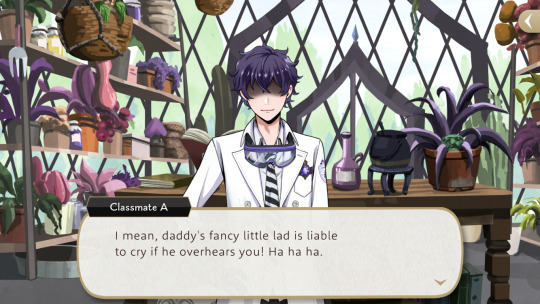
Now, within Pomefiore itself, it does appear that many of its students are upper class or at least sticklers for appearances. Their knowledge of brands and aesthetics itself is not damning evidence (anyone of any class could know this too; there’s also lots of non-rich people who obsess over brands). However, the fact that all of Epel’s first year peers already seemed familiar with how to handle a full set of cutlery at a formal meal does indicate high socioeconomic status, as the common man would not know how the heck a salad dork differs from the fish fork. (Most people use 1 fork or 1 spoon for the entire meal, and forget about having courses.) Buuut we shouldn’t assume that this one vignette is representative of all Pomefiore students, just as we cannot assume the one mean Pome A is a good example of all Pomefiore students, since there are limitations with the game. (Another famous game limitation is all Savanaclaw mobs being beastmen and every other dorm having zero beastmen mobs; in the manga, we see humans in Savanaclaw and beastmen in Heartslabyul. Riddle also verbally confirms that Heartslabyul has a cat beastman in the second Beans Day event.)
I think there’s definitely intersectionality at play as well. There’s something to be said for a culture clash in addition to a clash of classes. Epel is the only one in the main cast from a decidedly rural area where there isn’t much to do (ie no brand name shops) and everyone is close and casual with one another (ie there is little in the way of formalities). This likely contributes to the disconnect between Epel and his Pomefiore peers.
Now, where is this all leading to? Am I claiming that bullying based on socioeconomic status doesn't happen at NRC? Of course not! I have no doubt that it happens, but I don't think it's specifically the rich-on-poor type. In Epel's case, it seems to be the poor-on-(perceived to be) rich kind, but the opposite also occurs (in book 1, Riddle insults Yuu's pitiful education, something which is typically associated with the lower class; magic and magic education in particular is associated with the upper class). And, of course, we have the middle ground of people of similar socioeconomic status going at each other (for example, Leona and Malleus's rivalry). What's sort of sad is that the environment at NRC is conducive to animosity and no adults ever intervening because: 1) the students are so prideful, who would actually have the guts to tell an authority figure they were being picked on? and 2) the students tend to try and retaliate or get into fights instead, which only escalates the situation.
At NRC, I get the impression that class is one thing you could get bullied for, but that power and/or connections are much more important factors. Let's revisit Ruggie, who is the most impoverished of the main cast. If we assume that the less well-off students are predominantly the ones who get picked on, then shouldn't we have many examples of Ruggie being bullied? But he isn't. In fact, the big, burly Savanaclaw mobs (who are known to be combative) seem to defer to him instead of bullying him. Leona even leaves Savanaclaw in Ruggie's care while he is away in book 6, fully expecting that the mobs will listen to Ruggie. Why? Well, Ruggie is not physically or magically strong, but he has Leona's backing. It's through this association with the powerful Leona that Ruggie gains the respect and the following of the others in his dorm. This is something we consistently see in other characters, including Epel's own dorm leader. Because Vil beats him in combat, Epel agrees to listen to what he says even if Epel dislikes it. We see mob students bend the knee to the main cast once they've gotten glimpses into their power or abilities (Leona versus the Savanaclaw mobs, Idia versus the Ignihyde mobs, each in their respective Dorm Uniform vignettes).
Circling back around to the concept of Epel being bullied! Would the Pomefiore mobs turn on him if they realize he's actually not wealthy? Maybe...? We don't really know enough about the individual personalities of the mobs to judge for ourselves. If they did bully Epel for that though... I feel like those mobs would be in for an ass whooping from Vil (and Rook) for being so petty, vindictive, and disregarding decorum. Vil can rub people the wrong way with his demanding and stern attitude (I'm one of those people sometimes), but he wouldn't stand for such "ugly" behavior. It sullies the good name of the Fairest Queen and the dorm made in her image that he oversees.
Those are my thoughts on the topic! I apologize if I ended up straying a little from the initial ask (I felt like I wasn't even truly talking about Epel for half this post ashdbsadlbayw).
#twisted wonderland#twst#Epel Felmier#disney twisted wonderland#disney twst#epel labwear vignette spoilers#epel ceremonial robes vignette spoilers#notes from the writing raven#Ace Trappola#Deuce Spade#Trey Clover#Jack Howl#Ruggie Bucchi#Yuu#Riddle Rosehearts#Rook Hunt#Vil Schoenheit#Pomefiore#Leona Kingscholar#Malleus Draconia#book 1 spoilers#book 6 spoilers#Idia Shroud#book 5 spoilers
107 notes
·
View notes
Text
one thing about ham dani that nobody seems to get and why I'm always fighting for my life in the webtoon's comment section is that in all her fear and reticence around opening herself up with her friends, believing she belongs in this world, trusting in her place and relationships is that SHE'S NEVER WRONG ABOUT THE NEGATIVES. i think it's very easy to look at dani a hundred chapters in still going on about her place as a side character and what she can expect from them realistically, what she can allow herself to feel for them, and feel frustrated, like she's being deliberately obtuse. but dani. is. not. wrong.
one thing that many isekais do is that they will take the premise of "being transported to a novel" and use that simply as a vehicle for the FL to use her knowledge of the future to her advantage and turn the odds on their head. beyond the initial "ehhh why is the ML flirting with me??" which tends to wear off rather easily, there is little questioning about what being in a story means. and inso's law takes that question seriously. because dani IS inside a story, her friends ARE characters AND THIS IS EASILY PROVABLE SINCE THE BEGINNING. How? because she leaves.
it has happened to her before! It happens multiple times in the novel! that's why march 2nd is SO terrifying for her, because everything she's built can be taken from her in the blink of an eye and SHE will be called crazy and SHE will be left grieving and nobody else will remember what ONLY SHE LIVED. she is effectively, practically, tangibly separate from each world by this experience. when dani insists on the labels of main character, side character, the tropes and the narrative possibilities happening within them SHE'S NOT WRONG!! because those things are TRUE!!! I know it's easy to gloss over it bc we as readers just take everything in as a story, but the crazy plot points? they're insane to her too because SHE is a real person and others are not! They're characters! That's why it's called The Law of Webnovels because dani is making sense of the rules of a world which factually functions distinctly different from hers. she's not making that shit up, it's not (entirely) an emotional hold up. that's shit's fucking real.
the nuance is brought on by the fact that the characters are, in fact, also people. they behave like people (albeit inside the margins of wild webnovel logic), they feel like people and they see her as a person. but she does not entirely reciprocate, because to view them as people means assuming the hurt that will inevitably come when 1) she gets sent back into the real world and loses them all or 2) the plot to the novel finally kicks in and who knows if the guy she liked was the ML and will end up with her best friend and all her love and all her trying were for nothing. No matter what, dani loses.
there's also the fact, which i think is exemplified very clearly in her feelings towards her grades and being compared to yeoryung, that even outside the character/real person dichotomy, ham dani and the boys come from WILDLY different backgrounds. when they graduate high school, they will go to different colleges and they will get different jobs and the wide wide gap which dani had managed to bridge due to the magic of webnovel rules will be opened once again. in the social hierarchy of modern korean society, dani will be left behind. ban yeoryung is somewhat immune to this despite sharing similar socioeconomic status because she has 1) better social capital in the form of her beauty and intelligence and 2) plot armour immunity bc she's destined to be with one of the boys anyway (and again it IS destiny bc she's the FL and according to the genre clues dani's been gathering that seems to be the most likely outcome). yeoryung has resources and tools beyond the story that dani cannot access. even IF this wasn't the world of a webnovel, if they existed in the real world, yeoryung COULD feasibly climb her way up but dani? she's realistic about her prowess and she knows very well that being a good friend and a good person does not mean she will get to remain close to her friends who are much much much richer. my point here being that even if she weren't under the assumption (WELL TESTED!!! SCIENTIFIC, EVEN!!!) that she's in the world of a story ruled by story laws, she wouldn't be silly for guarding her heart against the possibility of drifting away from byr+the boys.
all of this is why i love dani's character arc and her as a person. she doesn't act irrationally. she only acts very, very humanly. it's why i loved the kidnapping arc and her confrontation with choi yuri. she has to learn to treat them seriously, as human beings, because despite factually being characters, they don't have the awareness of it and their lives are every bit as real as any other to them. it's part also of dani learning how to be a person herself, because she's still a kid growing up and learning what's what, and doing so in an environment much more stressful than the usual. i think people are being irrationally mean towards her simply because they do not make the effort to understand her.
#i love her. i love ham dani. favourite fucking girl ever.#inso's law#the law of webnovels#my life as a webnovel#my life as an internet novel#ham dani#and im tagging my meta so everybody knows HAM DANI IS RIGHTTTTT#SHES NEVER BEEN WRONG#I LOVE HER
129 notes
·
View notes
Text
Muse Mixup Madness—March 1, 2024
(If you don't know what this is, see this post)
welcome back to the second round of muse mixup madness! the first time around went great, and i'm hoping to see people have just as much fun with this one!
starting this month, i'm going to begin marking prompts as high or low fantasy. low fantasy prompts should be compatible with any blog canon, while high fantasy ones might inherently involve things that more grounded blogs might prefer to avoid, like eebydeebies, sapient pokémon, hybrids, or crossovers. there will always be at least one low fantasy prompt.
(note! these labels are completely arbitrary, and there are no rules in muse mixup madness. if you're a low fantasy blog and some interpretation of a high fantasy prompt appeals to you, go for it.)
with that out of the way, let's get into this month's prompts!
1. The Road Not Taken (low fantasy)
Everyone has had decisions to make in life, some of them more impactful than others. With this prompt, you'll be looking into what may have happened if your muse chose to pursue a different path in life from the one they did.
2. Rags to Riches/Riches to Rags (low fantasy)
A character's socioeconomic status growing up has a huge impact on how they interact with the world and the person they become. If your character's family was richer or poorer, how would that affect them?
3. Another World (high fantasy)
If your character was a Faller originating from somewhere other than the Pokémon multiverse, where would they be from? What would they be like? If your character is already a Faller, explore who they'd be if they'd been a Pokémon character from the beginning.
(For a lower fantasy take on this one, you can remove the crossover element and focus on the effects of being or not being a more canon-compliant Faller.)
4. I've Got a Type (high-ish fantasy)
Does anyone else remember typed humans? They were a minor character trend around a year ago before they died out, and now with hybrids around they've been more or less forgotten. I liked them though, so this prompt is for an AU where your character is one of them! If they already have a type due to being a Pokémon or hybrid, give them something unconventional for their species instead.
5. Bonded Rivals (high fantasy, requires partner)
Maybe it's coincidence that your character and your partner's keep meeting, or maybe it's fate pulling them to each other with some sort of invisible (or visible) tether. But whatever the reason, and whatever the level of supernatural involvement, every time they see each other there's some level of fighting or competition involved. After a point, they do have to have built up a mutual respect through that... right?
(Or in other words, this one's a soulmate AU, but for rivalry instead of romance. You can sprinkle in any trappings of that you like, or keep it wholly mundane for a more low-fantasy take if you prefer.)
a little note on that last one—it's entirely possible it appeals to you, but you don't have anyone to do it with. if that's the case, you can make an open invitation post on your blog or use the notes of this post to coordinate.
and once again, for my records, please answer the poll! again, it's not binding, this is just so i can gauge popularity for the prompts.
(also, please reblog this post when you see it instead of just scheduling it for day of so more people have a chance to see it while there's still time to prepare)
90 notes
·
View notes
Note
Here's a potentially controversial AG question for you.
Do you think adult Felicity would continue to own slaves?
Oh, wow, yeah, this is a heavy hitter. Honestly, historically and statistically, almost certainly yes. But there is definitely a semi-plausible chance otherwise.
I'm going to reframe this question slightly, because due to the legal system of coverture in her time, if Felicity marries, which she almost certainly will, her husband will have ownership of any property either of them bring into the marriage. So the question is more accurately: will adult Felicity be the wife and mistress of a household that owns slaves?
I don't mean to reduce adult!Felicity's moral or personal agency, but the answer to this question may also depend on who she marries, both in terms of his socioeconomic status and his personal beliefs about slavery.
Felicity's father and maternal grandfather are both slaveholders in the book series, though in different socioeconomic niches. Mr. Merriman is a shopkeeper in town with two enslaved laborers, Marcus and Rose. Grandfather is a plantation owner and there is presumably a larger workforce. (I can't remember exactly what the legal situation is after Grandfather dies in the final book, but I believe Mr. Merriman inherits the plantation through his wife which would imply she has no brothers, and then administers it while primarily living in town. I could just be completely making that up, though, and I couldn't find confirmation online and don't have my Felicity books on me at the moment.)
If she marries a man who is similar in socioeconomic status to her father (ie, a relatively prosperous shopkeeper or artisan in Williamsburg) he will likely own or rent slaves. If she marries someone similar to her grandfather, he definitely will. I can see either of these routes as plausible for Felicity. Living primarily in Williamsburg, she may be most likely to encounter townsfolk, but she would also potentially be courted by young men attending college at William and Mary, who would likely be from plantation families elsewhere in Virginia, or she might marry the son of one of Grandfather's neighbors or something. (Side note: there is one existing character in her books who might be a potential future Mr. Felicity: her father's apprentice, Ben. Felicity and Ben clearly get along really well and have a lot in common, and when Felicity reaches the age where she is thinking about marriage, Ben will likely be around, either still working with Mr. Merriman or a business acquaintance/family friend. It wasn't uncommon to marry someone with that kind of family/business connection at all. If Felicity were to marry Ben, he would likely eventually be in a similar socioeconomic niche to her father.)
So, what are the possible futures where Felicity and her husband are not slaveholders?
First of all, she could marry someone who is socioeconomically in a position where he simply cannot afford to do so. This is, imo, the least likely. I don't think her parents would encourage this. (I think Mrs. Merriman may have married slightly "beneath her" as I kind of got the vibe that Grandfather is wealthier than Mr. Merriman is, and he certainly is in terms of ownership of both land and slaves, which is how wealth was generally calculated in Virginia. On the other hand, this might also be a town/country divide, and Mr. Merriman is evidently able to comfortably provide for his family.) Also, if she was to fall in love with and marry someone of a lower socioeconomic rank, it is possible that her family would financially help him rise rather than that Felicity would just go off and be broke with him.
I think a more plausible route would be that Felicity either marries a man who is actively against slavery and her beliefs are then influenced by him or she independently develops anti-slavery convictions prior to her marriage and then chooses a man who has similar beliefs.
I do want to point out that there were a lot of Virginians in this general period who expressed anti-slavery beliefs while still continuing to own slaves. I think in many cases these people were experiencing genuine moral discomfort and conflict but ultimately chose to prioritize their own financial well being. I think, unfortunately, the most likely future may be one where Felicity experiences some moral qualms over slavery and questions some aspects of the society she lives in, but ultimately chooses to stick with the status quo.
However, I think there are some semi-plausible paths where Felicity and her husband might end up in a situation where they choose genuinely meaningful opposition to slavery. There are other situations in the AG books where characters get an ending that is better if historically less plausible, after all. (IE Addy's family is able to reunite. Samantha's relatives adopt Nellie.) Even if it's unlikely, this outcome for Felicity would not be unheard of.
For instance, she might marry a Northerner and goes to live wherever he is from. (If he chooses to move to Virginia permanently, he might also choose to conform to the economic system of the slave culture in his adopted state.) This happened with one of Thomas Jefferson's granddaughters who married a man from Massachusetts and moved up there with him. This would have been a woman about a generation younger than Felicity, but it's not outside the realm of possibility to happen earlier, either. I can't really picture Felicity wanting to leave her home and family, but if she's already developed anti-slavery beliefs on her own she might think it's worth it.
She might also marry a Virginian who believes slavery is wrong and is actually willing to do something about it. I wish I could remember the man's name, but I was just reading about some young plantation owner who wrote to Jefferson in the 1820s about his deep discomfort with slavery and his desire to free his slaves. Jefferson basically advised him to go slow and do nothing for the time being, and this man wrote him again chewing him out saying it wasn't enough. He ultimately chose to leave Virginia, and settle in Ohio, where he purchased plots of land so that his newly freed former slaves could start their own farms. This is later than Felicity would have been finding a husband, and this man's decision was one very few of his peers would have made. But, again, it's not impossible.
I think the man I just talked about had primarily ethical objections to slavery, not religious ones, but I think the most plausible way for Felicity to develop meaningfully anti-slavery convictions is through religion. The Second Great Awakening would have begun when Felicity was in her mid-twenties. Some people in Southern states who became evangelical Christians during this time period began to believe that slavery was a sin against God. The most famous example of this is Robert Carter III, a Virginia plantation owner who became a Baptist and ended up freeing over 500 people. (He also ended up having to flee the state of Virginia because people were threatening him over this and lived the rest of his life in Baltimore.) Evangelical conversions were most common among the lower classes, especially in the beginning, but also took off among women from higher social classes. Robert Carter notwithstanding, wealthier men were the least likely to be born again. So I think it's very plausible that Felicity might choose to become a Methodist or Baptist, but if she was 25+ at the time she would likely already be married and it is less likely her husband would also convert. So she might end up in a situation where she is opposed to slavery but her husband, who does not share her religious beliefs, is not, and he controls their property. Or, it's possible she marries later than the average, or she is widowed young and remarries a man from her church, or manages to convert her husband.
So, I can definitely see some pathways for an anti-slavery adult Felicity, but it would require both her and her husband to develop convictions and the moral courage to enact them that were highly unusual for people in their class and context. Unusual, but not unheard of.
#i hope this answers your question. we are rooting for you felicity.#i do think that the much more plausible outcome is that felicity grows up to be very much like her mother but. we will never know because#felicity is also forever nine years old#THIS GOT SO LONG I HAD TO READMORE IT
21 notes
·
View notes
Text
as the non-white daughter of white parents I can confirm that no matter how close you are to individual people of color, no matter how much you love them, most white people simply do not view racism as a systemic issue, but rather as Individual Instances Which Must Be Condemned. Unless white people actively educate themselves on the material consequences of racism, most of them don’t really understand it for what it is. In the case of Kendall and Sophie, he is already at a severe disadvantage due to him being A Literal Billionaire and whatever, where his primary goal as A Billionaire (and of all billionaires) is the deification of capitalism and all the exploitation that comes with it. Kendall certainly doesn’t see himself that way because capitalism overwhelmingly benefits him and those like him, so he thinks the system works and it works because he’s Figured It Out. And, of course, capitalism goes hand-in-hand with racism because the two will be forever inextricably linked unless they — and the systems that support them — are dismantled. Kendall is also so far removed from actual people’s actual lives that he really can’t fathom what Real People (who just so happen to look like Sophie) experience day to day. Instead, he views racism kind of as a nebulous concept, one that only affects those unfortunate enough to not be in a position to shield themselves from it. Because Kendall has the resources and infinite money to throw at problems, his “protection” of Sophie is Fixing the Problem. Sophie is physically protected and that’s all that matters, regardless of the fact that she even needs this protection scares her. Granted, as the child of a billionaire, Sophie herself very much does not have to encounter the same kind of conflicts that those lower down the socioeconomic ladder do — but she is not at all immune to it, either. Similarly, I know that as much as my white family loves me, most of my family members see only me as an individual, i.e., a cousin, niece, etc., but don’t necessarily extend that viewpoint to others who, again, Happen To Look Like Me. Roman, Shiv, and Connor all truly don’t make this connection either, as Sophie’s uncles and aunt, despite all of Shiv’s posturing. When Kendall tells Roman “some guy pushed Sophie,” Roman’s only response is “but she’s okay, right?” As if that’s the end of it. As if she wasn’t actually damaged, it wasn’t all that serious. As if that will be the only fallout. Any time that I’ve brought up racism that I’ve directly experienced to my white father, he’s taken it as a personal failing. Has he failed as a father? Has he failed to raise me, his child, to not be hardy and resilient enough to simply ignore These Things? How come his whiteness and all the protections that come with it didn’t extend to his daughter? How come his experience as a parent involves considering different things than if he had raised white children? Whose fault is it? Who or what can be blamed for inflicting that particular kind of pain on his child? Because racism is systemic, there is no bogeyman to point to, no Guy Who Pushed You On the Street who you can send your bodyguard after, or hire a van to tail your kid for her “protection.” She will continue to experience this specific kind of harm, especially under a nakedly fascist president, regardless of your wealth and status and power, and you were the one to sign off on it.
#succession#Kendall Roy#Sophie Roy#succession season 4#succession s4e8#America decides#Shiv Roy#Connor Roy#and we’ll GET TO Stewy and Lawrence and Marcia and All Of That too!! believe you me!!#also Sophie and I are both due damages from our white fathers
170 notes
·
View notes
Text
Submitted anonymously
One day I will describe to you the entirety of my hellish experience at the school of public health of which I attend, but until then here is just a sampling.
As a fat person, attending a public health school is extremely difficult (more difficult than I realized it would be) for many reasons, but two of those reasons are the two mandatory classes. I’m in an introductory public health class now and though it is supposed to cover all aspects of public health, every single one of the first ten lectures discussed obesity. We have guest speakers and they have all addressed it in some way or another.
The thing is, their topic may not have anything to do with weight specifically, but they always find a way to work it into their lesson. For instance, one woman was discussing the difficulties of surveying populations. She mentioned that the weight category was often a difficult one with regard to accuracy when people are self-reporting. She mentioned that no one ever says they are a heavier weight, because hell why would they-that would just be embarrassing for most people. This is not an exact quote, but it is pretty close.
First of all she laughed while she said this-super professional- and second, people with secret eating disorders would absolutely lie to say they weighed heavier in order to help cover up their secret. It was really frustrating to have this public health professional be so immature about such an important topic.
The worst thing about this class so far, however, has been the student presentations. A few have been about obesity (I think there is a competition over who can say the word obesity more frequently) and none of them have treated the topic with the least bit of sensitivity, maturity, or professionalism. The worst one started with showing graphs about how high weight correlates with low socioeconomic status, so far this is reasonable and points out a lot of issues America is having with regard to cheap food due to government subsidies. It took a turn for the worst when beside his talking points he showed degrading images. The first image showed a kid having trouble deciphering the difference between chocolate cake and a pile of vegetables, thereby reinforcing the stereotype that fat people really don’t know the difference themselves. The second image showed a very fat child eating at a McDonalds. I wondered if this child had consented to his picture being taken in the first place, much less put on the internet and made into a meme where this presenter presumably found it.
When people laughed at the image I felt disgusted and bile rise in my throat. What kind of monsters laugh at children; my peers are supposed to be professional adults.
Finally he ended his presentation with discussing ways to reduce obesity, but instead of discussing ways to close socioeconomic and inequality gaps, he only focused on what fat people need to do. He said that though doctors are telling fat patients to lose weight there must be some disconnect because so far it hasn’t worked so doctors should double down on fat patients. He was clearly implying that fat people were too stupid to understand their doctors the first few thousand times and just completely ignored how low socioeconomic levels come into play, even though he knew they did.
The second presentation discussed how sugary drinks caused obesity and because of that we should make labels more transparent. I am all for transparency when it comes to food labels, but there are a myriad of reasons for why sugary drinks are bad, not just because they make you fat. He then showed ads that “more accurately describe sugary drink products” rather than the ones with celebrities that are shown now. These ads showed faceless fat people with words that suggested that people not drink sugary drinks if they don’t want to look this way. These ads were in poor taste and extremely degrading.
Finally, the third presentation that was completely unprofessional discussed how black women had higher rates of deaths from breast cancer than white women. She said at the beginning these results controlled for BMI, but then went on to discuss how obesity played a huge role. She said that black women tended to be fatter than white women and that this trend in weight followed the trend in breast cancer death rates and that obesity must be the reason.
This reasoning seemed like she was just trying to find a reason to further blame fat people for all health problems. She said fat women had breast cancer detected later than thin women and I couldn’t help but wonder if that was because fat women are afraid to go to the doctor because they know they’ll be fat shamed. She had no discussion on that, just discussion on how black women needed to be educated on better food choices so that they and their children won’t be obese.
I have no problem in educating people on nutrition and helping them pay for groceries as one of her suggested programs discussed, but I do have a problem with only targeting fat people. Not all thin people understand healthy nutrition and not all fat people need to be educated. It is these assumptions that all fat people are lazy, stupid, ignorant, and in desperate need of a savior that make me feel both angry and full of despair at the same time. I have to give my presentation next week (about air quality), but I am honestly wondering how I am going to be able to do so in front of a group of people that can’t take me seriously because they find me to be both disgusting and an idiot. I have never felt so anxious in my life.
#thin privilege#fatphobia#fat discrimination#trigger warning#the o word#obesity is not a disease#medical fatphobia
63 notes
·
View notes
Text
Stranger Things Lucas on the Line Review

If you haven’t yet, be sure to check out my other Stranger Things Reviews. Like, Reblog, and let me know what your thoughts are regarding the show or the upcoming season! :)
Stranger Things Comics/Graphic Novels:
Stranger Things Six
Stranger Things Halloween Special
Stranger Things The Other Side
Stranger Things Zombie Boys
Stranger Things The Bully
Stranger Things Winter Special
Stranger Things Tomb of Ybwen
Stranger Things Into The Fire
Stranger Things Science Camp
Stranger Things “The Game Master” and “Erica’s Quest”
Stranger Things and Dungeons and Dragons
Stranger Things Kamchatka
Stranger Things Erica The Great
Stranger Things “Creature Feature” and “Summer Special”
Stranger Things Tie-In Books:
Stranger Things Suspicious Minds
Stranger Things Runaway Max (Part 1 of 3)
Stranger Things Runaway Max (Part 2 of 3)
Stranger Things Runaway Max (Part 3 of 3)
Stranger Things Darkness On The Edge Of Town (Part 1 of 3)
Stranger Things Darkness On The Edge Of Town (Part 2 of 3)
Stranger Things Darkness On The Edge Of Town (Part 3 of 3)
Stranger Things Rebel Robin Book and Podcast (Part 1 of 2)
Stranger Things Rebel Robin Book and Podcast (Part 2 of 2)
Stranger Things Hawkins Horrors Review
Stranger Things Flight Of Icarus
Stranger Things Episode Reviews:
The Vanishing of Will Byers (Part 1 of 2)
The Vanishing of Will Byers (Part 2 of 2)
Synopsis: Set between the events of seasons 3 and 4, the book follows Lucas during his freshman year of high school as he attempts to chart a different course for his life, taking up basketball as a means of trying new things and getting out of his comfort zone. However, Lucas soon realizes this won't be as easy as he initially thinks: His attempts to blend in with the popular crowd put him at odds with Mike and Dustin, his relationship with Max is deteriorating, and Lucas is forced to face hard truths about how insidiously racism is woven into Hawkins and what it means to be one of the few black kids in a mostly white town......
Observations:
Lucas on the Line acts as a conclusion to what I call "The Outcasts Trilogy," which began with Rebel Robin, followed by Flight of Icarus, and ending with this book. All these Tie-In novels center around three characters (Robin, Eddie, Lucas) who are considered outcasts in Hawkins: Robin is secretly a lesbian in a homophobic culture, Eddie is the town freak due to his interest in D&D, guitar, his low socioeconomic status, and his family's reputation because of his dad's criminal past, and Lucas is a black kid in a society where racism and prejudice are still prevalent. All 3 characters deal with feeling inadequate and unwanted, and attempt to cope with their situations by either blending into the crowd, or else attempting to escape Hawkins. All 3 of them eventually face hard truths and learn to stop denying the aspects of themselves that make them unique.
In Lucas's case, now that he's older and in high school, not only is he beginning to realize the implications of what it means to be black in a neighborhood where racism still lurks, but he's also beginning to understand his family's history, as well as coming to terms with an uncomfortable truth: As much as his friends care about him, they will never truly understand the bigotry and micro-aggressions Lucas is forced to endure as a person of color.
The show has touched on themes of bigotry and racism before, both in Lucas's interracial relationship with Max (which makes him a target for Billy) and the type of bullying he experienced from Troy and James. However, this book expands on those themes by going more into Lucas's fears and insecurities at being discriminated against for being a nerd AND being black, as well as finding someone who understands what he's going through. It also, IMO, deconstructs the "token minority" trope by showing what it's like to be considered that in a group of white friends from the perspective of said minority character, and how dehumanizing it feels.
This book left a lot to ponder. It's not perfect, and there are some flaws in its structure (mostly relating to continuity errors and missed opportunities), but it does inspire discussion, and gives a solid point-of-view to Lucas's character.
Part 1: Lucas's Journey
For as much as this fandom talks about Steve's character development (not that the discussion is unwarranted), Lucas is also another character (next to his sister Erica) who's had subtle but notable growth over the course of the show.
Season 1 had Lucas start out as a loyal member of the Party who was invested in finding Will, but also at odds with Mike and Dustin over El due to his distrust of her (something which got him a lot of flak from fans at the time). All of this came to a head in the junkyard when Lucas realized El was deliberately misleading them so they wouldn't find the Gate, leading to an ugly fight within the group. However, once things settled down, and Lucas realized El's misdirection was her attempting to keep them safe and not an act of maliciousness, he apologized for how he acted (with El also apologizing for lying) and welcomed her into the group, formally accepting her as a friend and member of the Party. Notably, in spite of his misgivings, he never betrayed El to the authorities, demonstrating that his heart was in the right place.
Season 2 continued on with this development. Contrast Lucas's acceptance of Max into the Party and his willingness to reach out to her vs how he initially acted with El in S1. It's notable since, at the time, Mike was hostile towards the idea of Max becoming part of the group. While Lucas had a crush on Max (which is normal for a boy his age), what separated him from the others was his willingness to listen to Max, who had always felt unheard in her house. That conversation on the bus rooftop in S2, where she opens up to Lucas about her home life and how she fears she's becoming like Billy, was meaningful to both of them, not just in Lucas reassuring Max she was a good person, but also Lucas really seeing Max for who she was and loving her for it. And in spite of the threat Billy posed, Lucas refused to be scared off by him (even kneeing Billy in the groin when he pinned him to the wall), and that willingness for Lucas to fight for Max was one of the many reasons Max finally stood up to Billy and made it clear to him that she was done with his abuse.
Season 3 showed Lucas was still navigating his relationship with Max (after getting dumped 5 times), as well as doing his best to advise Mike about his relationship with El. He also got some cool moments, from saving El from the Meat Flayer by chopping off its tendril, to gathering the fireworks to use against the Meat Flayer at the Battle of Starcourt. In spite of this, I remember at the time some fans (including me) wished Lucas had a bigger role in the story. The Duffer Brothers must have heard those criticisms because Lucas ended up getting his own arc in the next season.
There were a lot of great moments in season 4, but Lucas's story was a favorite for me because of how relatable it was. He was in high school trying for a fresh start. He still participated in D&D (Hellfire Club) but also joining basketball because he wanted to break out from being the nerd who was picked on all the time, and because he enjoyed the sport and wanted to give it a shot. He was discovering his identity, which is a big part of the high school experience. Adding onto this, a part of him wanted to achieve popularity as a way of being recognized instead of constantly looked down upon. He got what he wanted when he won the basketball championship............and then experienced firsthand the darker side of popularity, which forced Lucas to ask himself if this is what he really wanted.
Lucas on the Line expands more on the S4 arc by showing the events that led to Lucas doing basketball, and how that put him at odds with Mike and Dustin for a while. We also get to see the circumstances behind his breakup with Max, as well as her spiral into depression following Billy's death.
Something I appreciate is the book doesn't shy away from the trauma and PTSD Lucas is dealing with. The show usually gives that focus to characters like El, Max, Will, Joyce, Hopper, and Nancy, so it's refreshing to see how Lucas has processed everything since Will's disappearance in 1983. The answer is not well. It's even gotten worse since the Battle of Starcourt:
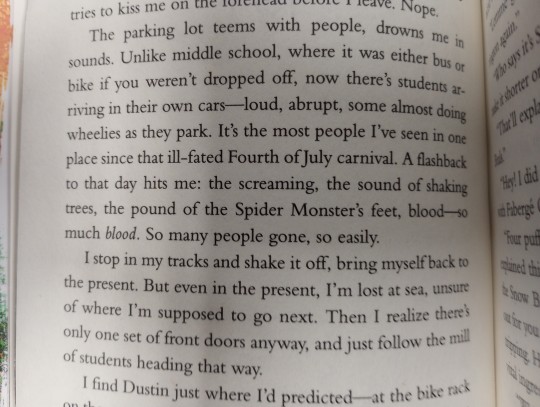
Similar to the way Robin in her novel talks about Hawkins High as a metaphorical monster, there are multiple instances where Lucas makes comparisons between his living situation in Hawkins and the Upside Down:
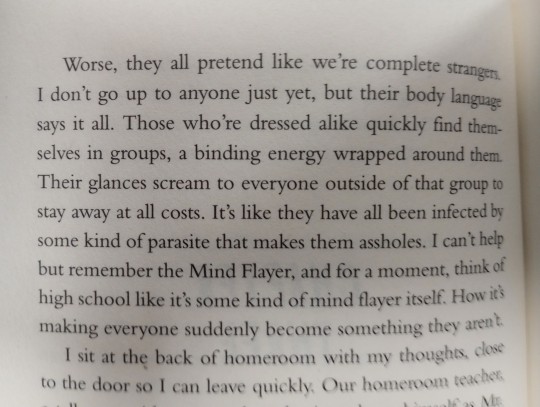
Granted, this is a metaphor that anyone who's watched the show enough times can pick up on: For as much as Hawkins presents itself as an idyllic neighborhood, there is rot within it, and NOT just from the Upside Down. The town has deeply rooted bigotry entrenched in its structure that takes on many forms (racism, homophobia, bullying, fear-mongering, forced conformity, etc) which the characters are forced to endure on a daily basis. From a symbolic standpoint, the Upside Down is all the nastiness within Hawkins that's covered up with a pretty surface. It may be a town that presents itself as perfect, but the moment you actually take a closer look at your surroundings, you realize that "perfectness" isn't genuine, and that people who present themselves as friendly can reveal just how awful they are in the right circumstances.
I live in a neighborhood like this, and I've been forced to learn time and again that some people in my town (though not all of them) have deeply rooted prejudices and will normalize being cruel because they can get away with it, all the while justifying their behavior as normal. Becoming cynical and cautious is how I've survived it. It reminds me of how Max thinks about her abusive situation with Billy: If you keep the monsters close to you, you're never caught by surprise.
Getting back to Lucas, he's painfully aware of this. Part of his PTSD and trauma isn't just from encountering the horrors of the Upside Down, but also from all the years he was bullied in school:
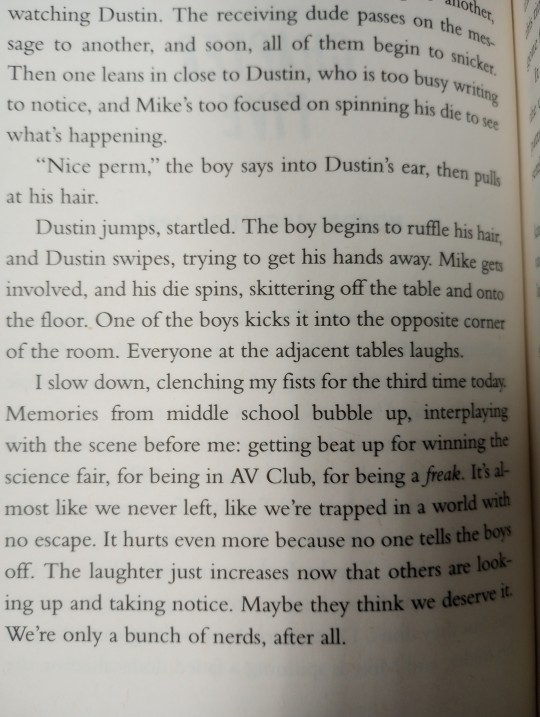
Lucas explains this to Mike and Dustin on the show, but part of his reasons for joining the basketball team is because he thinks it'll get him in with the popular crowd, and people will stop harassing him. What he doesn't understand (and what Mike and Dustin pick up on pretty quickly) is that even if Lucas changed everything about himself to fit in, he will always be walking on eggshells with that group. If he does everything right, he'll be tenuously accepted, but if he gets one thing wrong, or makes the team look bad in any way (even unintentionally), they will rip him to shreds. I even question what would've happened if Lucas failed to make the winning shot at the championship game: Would the team and the crowd have been as accepting of Lucas for that, or would he have been ostracized on the spot?
I know there are people in this fandom who vilify Mike and Dustin for going to Hellfire Club over Lucas's basketball games. As time has passed, I maintain they made the right call. Not only were they bullied by the basketball jocks way before they joined Hellfire Club (with Jason doing nothing to stop it), but they could see Lucas was deluding himself, and that these were not the kind of people they wanted to be friends with. At least with Eddie, they were accepted for who they were without having to make major changes to their identities to fit in. Even with Lucas, Eddie still welcomed him into the Hellfire Club despite his initial reluctance and the fact Lucas was on the basketball team. He didn't care that Lucas was black (which was a problem for several white basketball jocks like Lee Garroway) or that Lucas had extracurricular activities outside of Hellfire. He just cared that Lucas wanted to be there and was willing to invest in their D&D Campaign.
(SIDE NOTE: This is a big reason I roll my eyes hard at Billy stans who whine about Eddie being a similar replacement for Billy. The major differences between Eddie and Billy is a.) Eddie wasn't a bully, b.) Eddie didn't care about becoming Kings of Hawkins High like Billy did, and c.) Eddie could afford to be in the same room with Lucas for more than 30 seconds without being racist towards him or wanting to attack him. Enough said.)
And it should be noted that while Mike and Dustin are skeptical about Lucas doing basketball, they eventually accept it and even show up to one of his basketball practices (along with Erica) where Lucas does his best and still gets shit from his teammates for how he played.
Both Mike and Dustin saw how Lucas was being treated, as well as the fact Lucas was benched up until the championship, and they rightfully concluded that even if Lucas became popular, a.) It wouldn't change how THEY were being treated (no matter what Lucas told them), and b.) Lucas would forever be trying to live up to expectations from others until he became a shell of his former self. It's a lot like what Chrissy Cunningham went through where she maintained the perfect popular image as the Queen Bee of Hawkins High at the cost of her mental health and well being.
To Lucas's credit, he eventually realizes this at the end. As angry as he was at Dustin and Mike for skipping the Championship, he came to understand why they made that decision. When the time came between choosing Jason and the basketball team vs his friends, he chose his friends:
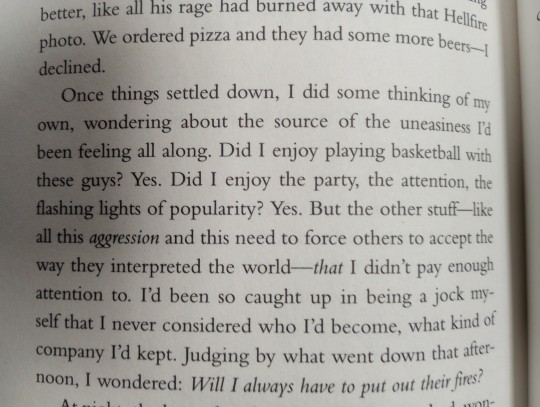
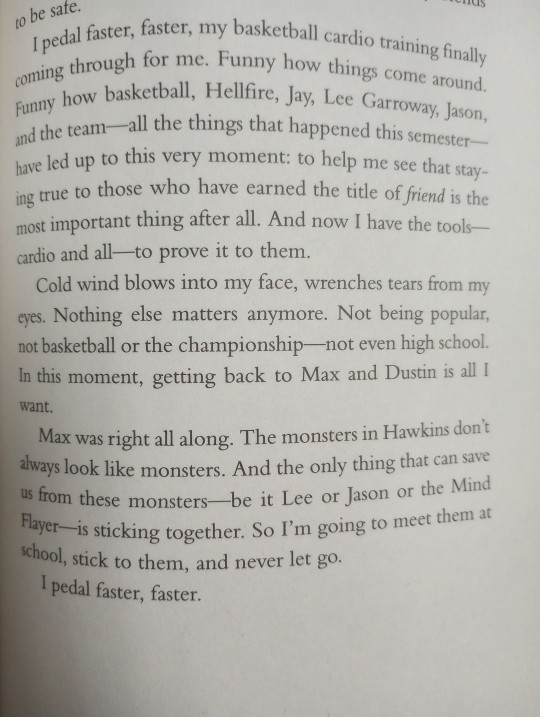
Caleb McLaughlin even noted this in an interview post S4: Lucas wanted to find acceptance, but the problem is you can't force other people to accept you. Mike and Dustin, in spite of their flaws, accepted Lucas for who he was. Jason and the other basketball players (with the exception of Jay) only accepted Lucas when he either made the team look good, or when they wanted something from him.
This doesn't necessarily mean the book (or even the show) paints Lucas wanting to do basketball as a wrong thing. It was a choice like everything else. Lucas's reasons for wanting to do basketball went beyond just wanting to be popular: He wanted to try something new. He wanted something he was passionate about. Not only did he find that, but he also got to share it with another teammate who understood him: Jermaine "Jay" Demario.
Part 2: Lucas's Relationships with other characters
Jay is a new character from the book who's not only one of the few black kids in Hawkins, but also one of the only basketball players who treats Lucas decently and takes him under his wing. He's the one who encourages Lucas to step out of his comfort zone and try out basketball. He's also one of the few jocks (though he doesn't consider himself a jock in the traditional sense) who's a decent person, and Lucas looks up to him as a mentor the same way Dustin does with Steve. Jay gives Lucas useful advice about balancing his extracurricular activities with other aspects of his life, and he's the one who trains Lucas to do well at basketball, from practicing after school with him, to having Lucas check out videos of NBA playoffs and finals to improve his skills. He also accepts Lucas wanting to do Hellfire Club, and tells him there's nothing wrong with being both a jock and a nerd.
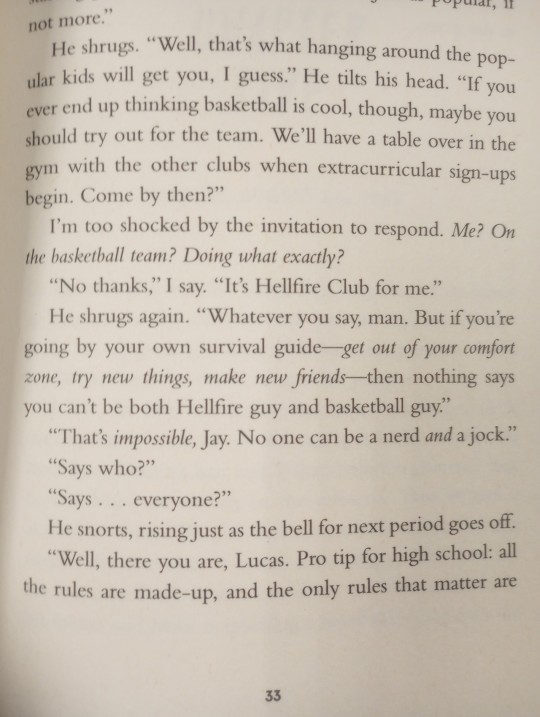
Speaking as someone who made Varsity for cross-country and track & field AND took AP classes during high school, I can relate to that last bit! 🙂
Jay was a cool character, and I'm sad he wasn't in the show. It's nice Lucas was able to have a friend, however briefly, whom he could confide in, and who understood the issues Lucas dealt with because of who he was and where he lived (more on that in a minute).
Erica's relationship with Lucas also gets a bit more time here. She's still snarky towards Lucas, but there are moments demonstrating she cares for him. For instance, despite initially criticizing how Lucas played during a practice, she is pissed when Lee and some other basketball players call Lucas a racist slur:
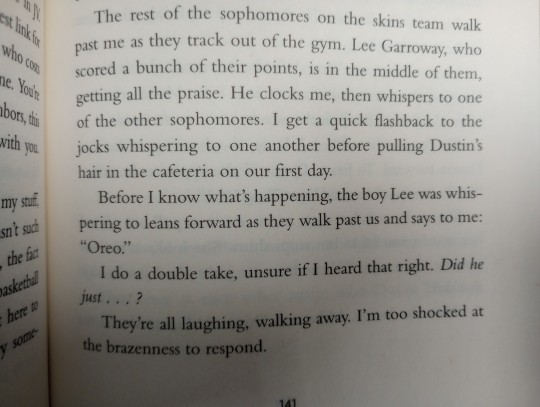

Later on, after Lucas becomes the target of a bomb threat, there's a quiet scene where Erica comes in to hang out with Lucas. Even though she doesn't verbally say it, it's clear from her demeanor she's genuinely worried for Lucas's safety:

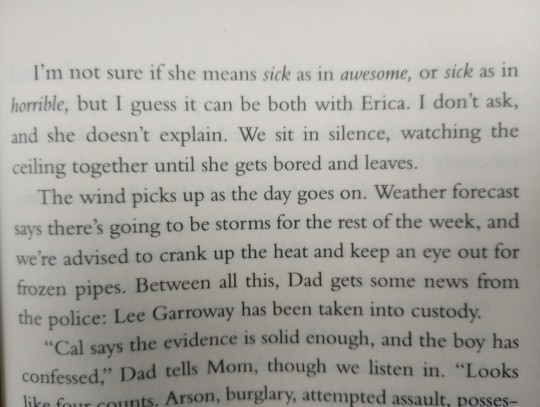
She may exchange barbs with him, but she knows where to draw the line. The fact she also showed up for all of Lucas's basketball games on her own accord (minus the championship) despite Lucas being benched conveys she supports her brother in her own way. I liked the evolution of Lucas and Erica's relationship in S4, and I'm hoping that continues into S5. If the final scenes of S4 are any indication of foreshadowing, they'll likely be working together, so we'll probably get to see more of their sibling dynamic.
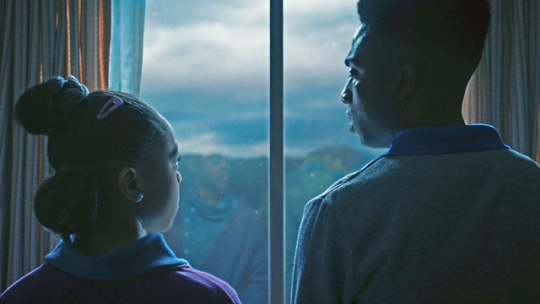
Max's relationship with Lucas also gets focus. For the most part, they are not in a good place. Ever since Billy's death at Starcourt Mall, Max has fallen into a deep depression and become withdrawn from everyone, including Lucas. A good chunk of the story is Lucas trying to reach out to Max and make it clear to Max that he's there for her. The problem is he doesn't know how since Max keeps rejecting any attempts to hang out with him, or for him to help her. The dynamic is sadly realistic for anyone who's had friends or family who suffer from chronic depression and feel frustrated or helpless when they try to help that person recover. Lucas does everything he can for Max in the book, from giving her the space she needs, to offering to listen to her. We also get to see Lucas's perspective on why he cares so much for Max (just like Max's novel showed us why she was attracted to Lucas):

What's sad is Max does understand what Lucas is trying to do. She knows he cares about her. At the same time though, she can't pretend things are normal anymore, or that she doesn't feel immense guilt over how she wished something horrible would happen to Billy and got her wish granted (as she admits to Vecna in the S4 finale), or that her life hasn't changed for the worse:
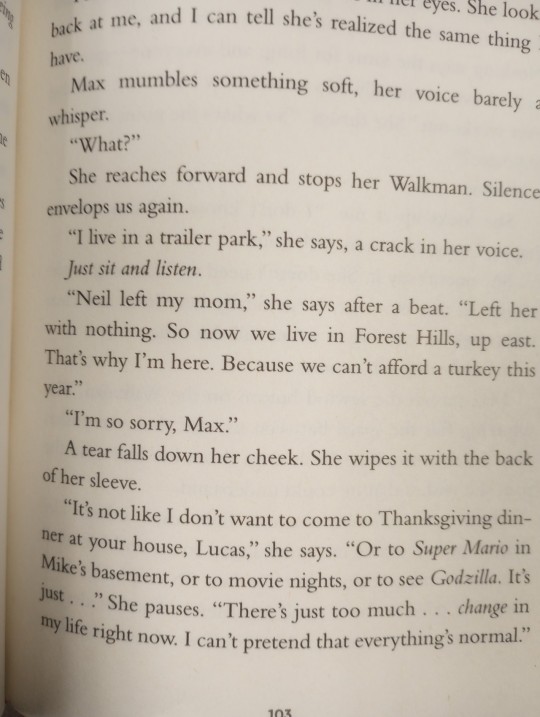
BTW, the breakup between Max and Lucas that's alluded to in S4 happens in the book. It's during Thanksgiving when Lucas sneaks out of his house to give Max some Thanksgiving dinner while she's at the skating park. It's also the first time Lucas hears Max play "Running Up That Hill" by Kate Bush and truly understands the meaning of that song........and what it means for their relationship:

What's admirable about Lucas is that, in spite of what's going on with Max and her attempts to distance herself from him, he still keeps fighting for her any way he can, right up to the end of the book when Vecna tries to kill Max the first time in the graveyard. And it pays off. Those memories she has of her time with Lucas, combined with the moments she shared with her friends, allow her to break free from Vecna, to remember she has something to live for, that she has people who care about her, and that she doesn't have to be consumed by guilt over what happened to Billy.
Speaking of Billy, the few times Lucas brings him up, he does NOT talk about Billy in a positive light. If there was any doubt about whether Lucas hated Billy, this book puts that to rest. One passage in particular stuck out:
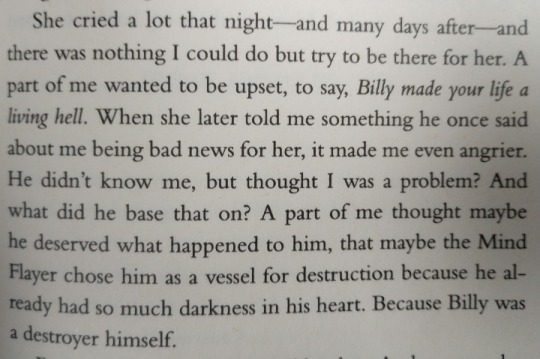
I know Lucas is projecting his anger towards Billy in this moment (not that I blame him), but the idea that Vecna/The Mind Flayer was drawn to Billy because of the darkness in his heart is an interesting idea. We know Vecna initially spared El at Hawkins Lab while killing the other kids because he saw a lot of himself in El (both with her struggles developing her powers, and her treatment under Brenner and her "brothers/sisters") and believed El would be grateful to him for "saving her." It's also implied on the show (and by Vecna's actor, Jamie Campbell Bower) that Vecna feels the same way about Will, which is why he has a creepy interest in him. Billy in many ways resembles Vecna in his rage and sadistic desire to hurt everything and everyone around him, and that aspect may have attracted Vecna to Billy. Granted, it's hard to know if that's the case since Billy was initially driving that night to hook up with Karen before crashing by the warehouse where that piece of the Mind Flayer was nesting, but it's also possible Vecna could have sensed Billy before then, and thought he'd make a great candidate to put his plan into motion.
Then there's Lucas's relationship with Jason: Lucas picks up pretty quickly that something's off about Jason, particularly when he's preparing for the prep-rally speech by slamming his hands in the lockers hard enough to leave dents. Lucas also isn't impressed with Jason's speech, and rightfully notes that Jason invokes the Starcourt tragedy for "cheap audience reactions" (which is why Max looks hurt in the scene when Jason brings up Billy). There's also a scene after Jason's confrontation with Eddie in the cafeteria where he and Andy make disparaging remarks about people who live in trailer parks. When Lucas speaks out against that (because Max was forced to move into a trailer park after Neil left Susan), Jason loses his shit:
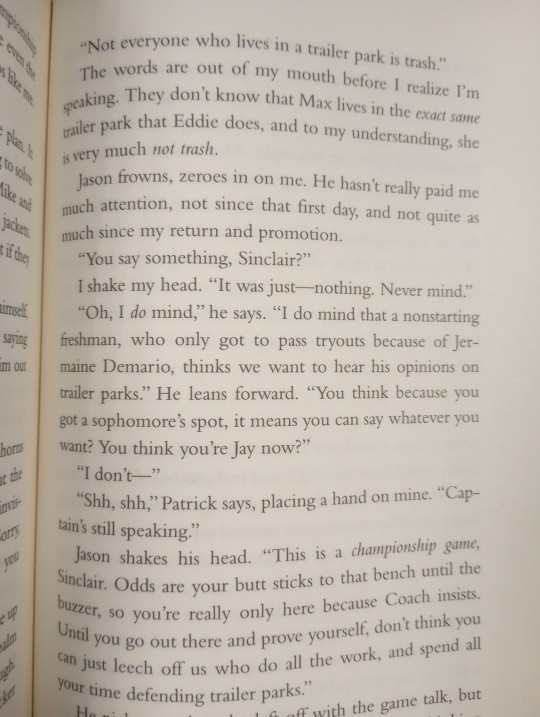
By the time of Chrissy's death when Jason's organized the basketball team into hunting down Eddie and tortures Gareth for information, Lucas finally understands just how unhinged Jason is, and even compares Jason to Billy:
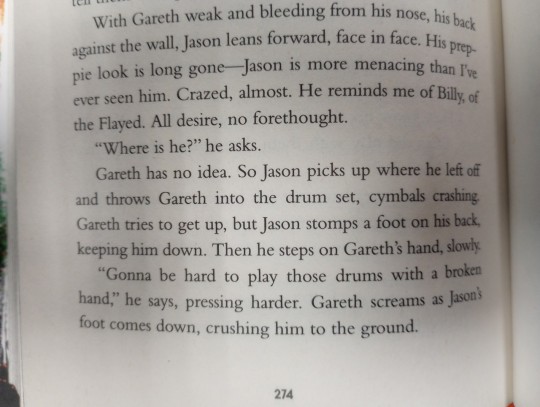
I know some people defend Jason on the grounds that Chrissy's death impacted him in a negative way, and that Patrick's later death made things worse because it happened under circumstances that couldn't be explained, which is why Jason jumped on the "Hellfire Club is a Satanic cult" bandwagon. While there is some truth to this, it ignores how Jason already had negative qualities brewing underneath, and that Chrissy's death didn't create these issues, but instead brought them to the surface in the worst way possible. Jason already had inherent prejudices against D&D and anyone he deemed as a "freak" (as depicted in the Flight of Icarus book) and the show established that he had a very self-absorbed, hot-headed, entitled attitude even before things got bad. Maybe he was initially able to keep these negative qualities under control, but they didn't magically manifest out of thin air just because Chrissy died.
Regardless of whether we chose to admit it, we all have a dark side. We all have aspects of our personality we're not proud of. Jason is no different in that regard. The problem is the lack of self-awareness on his part about those flaws, combined with his self-righteous belief that he was doing the right thing even though his actions put innocent people in danger.
I could sympathize with Jason over the deaths of Chrissy and Patrick, but my sympathy ended when he organized a Witch Hunt against the Hellfire Club (who had NOTHING to do with Chrissy and Patrick's deaths) and not-so-subtly threatened Nancy at the gun store and made it clear he intended to go after Mike. At that point, I was done with him. Judging by the final conversation between Lucas and Jason, where Jason refuses to hear Lucas's explanations about what's going on because it doesn't fit with his preconceived notions, Lucas was done with him as well:
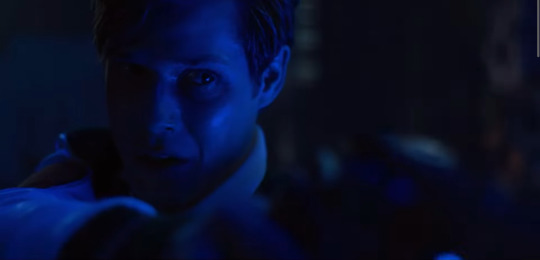
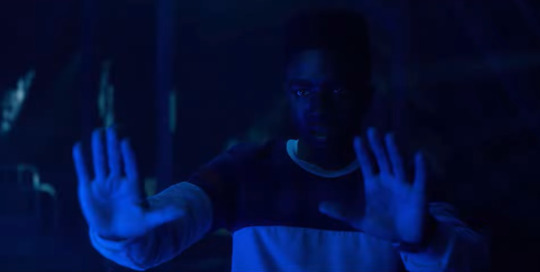
Jason: "I never should have let you in the door."
Lucas (coldly): "And I never should have knocked. I thought I wanted to be like you. Popular. Normal. But it turns out normal's just a raging psychopath."
Truer words have never been spoken.
Part 3: Lucas's Experiences with Racism and Bigotry
Lucas has been made the target of racism by characters like Troy, James, and Billy on the show, but this book is where Lucas begins to understand the full ramifications of what it means to be black in a world where racism is ingrained into society. We also get to see how it psychologically impacts Lucas and feeds into his worst insecurities.
Take Lucas's introduction to the basketball team for instance: For the most part, his tryout is average (not awful, but not spectacular), but Jason still allows him on the team for one particular reason:
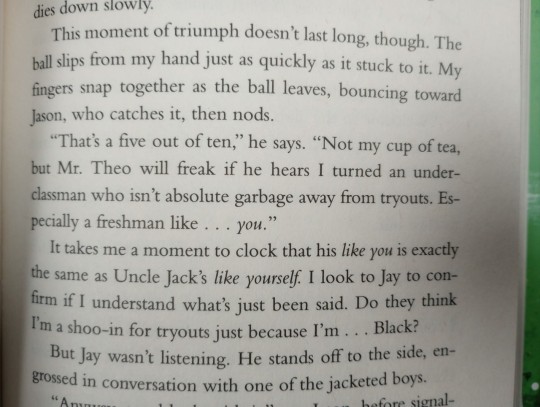
There's always been a question in the fandom about whether Jason was racist in the same way Billy was. I know Caleb doesn't think so, and argued Billy was worse (and given the the amount of mental gymnastics certain fans have done to pretend Billy wasn't racist, as well as Caleb's experiences with racism in the fandom, I get where his position is coming from), but this book suggests otherwise. Jason may not have been as overtly racist as Billy was, but there is a soft bigotry at play here in Jason allowing Lucas on the team BECAUSE he was black as opposed to Lucas's actual skills. Some people will probably argue against Jason being racist because of his friendship with Patrick, but that's basically the "I can't be racist because I have a black friend" argument.
What's depressing is this haunts Lucas for the remainder of the book. In spite of how hard he practices to get better, he can't shake off the idea that he was only let on the team because of his skin color (and because of the stereotypical idea that all black people do basketball), and not because he earned it. This is reinforced by other members of the basketball team, led by Lee Garroway, who not-so-subtly takes every opportunity to remind Lucas of this:

Speaking of which, this book introduces another bully in the form of Lee Garroway, and he's a loathsome piece of work. Like Billy, he is outwardly racist towards Lucas, but he takes it a step further in targeting both Lucas and Jay because he, along with several other members of the team, are pissed that they made it to the subs roster (thinking Lucas and Jay only got that position because they're both black) and could potentially make Varsity, which is a position they all want. This all culminates in Lee rigging both Jay and Lucas's lockers to spray them with glitter, and then later rigs Lucas's locker again with a bomb that almost kills a janitor working at the school. Lucas manages to catch Lee in the act by planting a camera in his locker after the first attack, and even though the footage gets Lee's friends expelled, Lee is still let off the hook because his father is a donor to the school and bribes Mr. Higgins into covering it up. It's similar to what happened in Flight of Icarus when Eddie accuses Mr. Higgins of looking the other way when it came to athletic players like Tommy and Jason who bully other students and are allowed to get away with it because their fathers have the principal in their pockets.
Remember that profoundly stupid comment from the Angela apologist I talked about in my review of Darkness on the Edge of Town?

This is why that comment struck a nerve: Putting aside how this take is completely devoid of critical thought, it misses the fact that the reason bullies like Angela, Jason, Tommy, and Lee feel justified in their behavior is BECAUSE most of the adults enable them. At best, they do the bare minimum in disciplining these teens, and at worst, they look the other way and punish people like El and Eddie who try to stand up for themselves and others.
And I'm sorry, but the "They are children, none of them are responsible for what they do" excuse can take a flying leap into a volcano for all I care. If you deliberately make a bomb that you know will put someone in the hospital (or even get them killed), you are responsible for your behavior. This isn't like Lee was incapable of understanding what he was doing was wrong. To imply otherwise is stupid beyond belief. 🙄
What's infuriating is not only does Lee barely get a slap on the wrist for what he did, but the bomb threat was enough to cause Jay and his family to move, meaning Lucas lost one of the few friends he could depend on.

On top of that, this isn't even unique to Jay's situation. Both of Lucas's parents also have history which involved moving around to find a place where they could, at the very least, be tolerated in their community. All the while, they knew on some level they'd never truly be accepted:

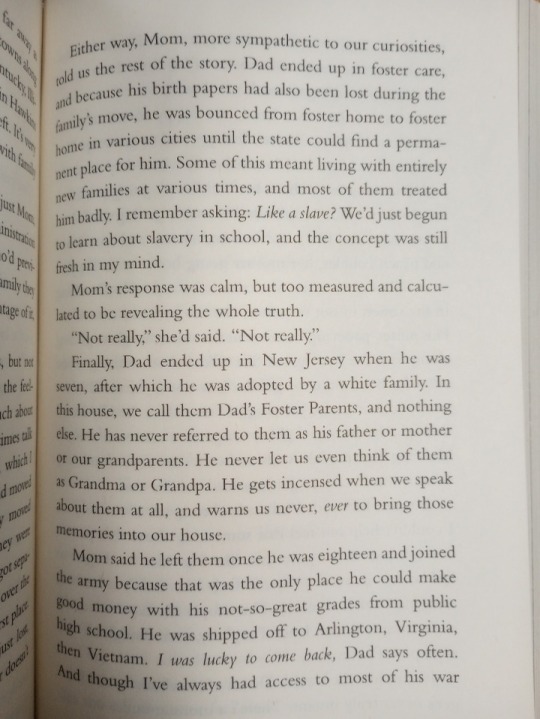
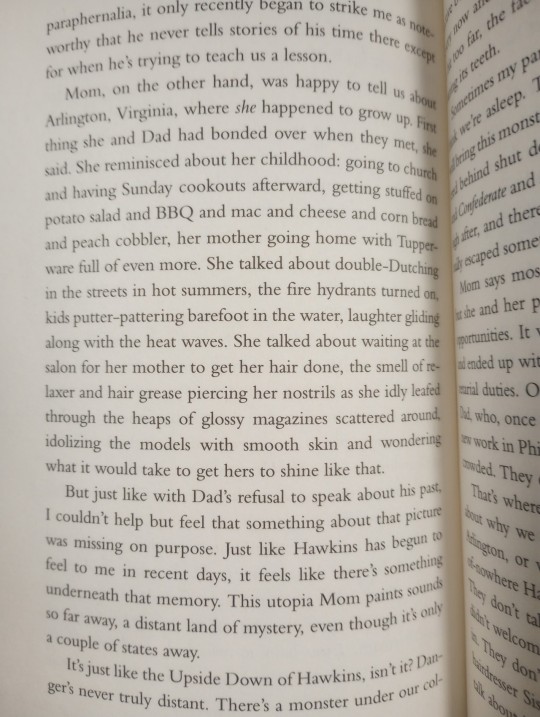

Lucas's parents did the best they could in trying to protect Lucas and Erica and raise them so they wouldn't have to go through the same circumstances they did. The problem though is that racism has become normalized to such an extent that there isn't a way to escape it.
On a related note, this is why I find the current attempts by Conservatives to stop Critical Race Theory from being taught in schools to be vile: These people want to pretend racism is a thing of the past, like it isn't still impacting people of color in the United States to this day, and are perfectly okay trying to whitewash history and limit any attempts at discussion to achieve that goal. It's been an ongoing issue where I live (to the point that last year, three new members were elected to the school district so they could push their agendas and prevent CRT and other "undesired talking points" in schools), and I know it's been an ongoing issue elsewhere in the United States (*cough* Florida *cough*). John Oliver did a brilliant breakdown of this last year, and I highly recommend watching it:
youtube
Just like with many of the other books in this series (Darkness on the Edge of Town, Rebel Robin, Flight of Icarus, etc) Lucas on the Line illustrates that many of the social issues these characters experienced in the 80s continue to be a problem today. Very little has changed, and while people might be more willing to hide their bigotry, or pretend it's something else, that doesn't mean it's gone.
Part 4: Missed Opportunities and Continuity Errors
Like I said before, this book isn't perfect, and has its flaws. I can't speak for what notes Suyi Davies, the author of the book, got from the Duffer Brothers and Netflix, but there were some major contradictions that were hard to ignore.
For instance, there's a flashback where Lucas is supposed to be in third grade and first experiences discrimination against him when the other kids are afraid of swimming with him because they think his "blackness" will rub off on them. While the flashback is effective in showing the insidiousness of how kids can be bigoted at a young age, it's undermined by the date this flashback is supposed to take place in: June 6, 1981. At this point, Lucas would have finished fourth grade, not third grade. On top of that, it's mentioned that Lucas wasn't friends with Mike, Will, and Dustin yet, but that's not only contradicted by other tie-in materials, but also by Dustin's claim on the show that he didn't join the Party until he was in 4th grade, which would have been around 1980. For Lucas to be in third grade in 1981 and not know any of his friends at this point makes no sense.
Then there's the third act of the book, which takes place within the first four episodes of S4: The show establishes the events in those episodes takes place between March 21st-24th, 1986. However, the book changes this so it takes place between April 4th-7th, 1986. The reasons for this are unclear, especially since this book came out AFTER S4 premiered, but I suspect it may have something to do with "Birtdaygate" (i.e. the Duffer Brothers forgetting Will's Birthday was supposed to be on March 22nd). I can't tell if Netflix was trying to retcon the dates because they were embarrassed by "Birthdaygate," or if S4 was originally supposed to be set in April before they changed it to March at the last minute (which begs the question of why they did that), but it is something that's been on my mind for a while now.
Moving past these errors, I was disappointed the book didn't expand more on Patrick's character despite having the opportunity to do so. In the show, Patrick demonstrates a friendlier side to Lucas during their time together, and I know it was speculated at the time that there was more to his interactions with Lucas. However the book doesn't explore that angle, and we don't get a lot of information about Patrick. It's frustrating because, out of all of Vecna's victims, Patrick is the only one that doesn't get his backstory fully fleshed out. We see why and how Chrissy, Fred, and Max were targeted, but it's only implied in Patrick's case. Lucas speculates Patrick had an abusive father, but neither the book nor the show elaborate on this, which makes Patrick come off as a wasted character, especially when his death could have had a bigger impact on Lucas.
Finally, this is just a minor nitpick, but I was unhappy that the book didn't seize on the opportunity of Lucas and Steve playing at least one game of basketball. There's a scene in the book when Steve offers to go one-on-one with Lucas, and Lucas turns him down:

For the story's sake, I get why they had Jay be the one to practice with Lucas as opposed to Steve, but it still feels like a missed opportunity, especially when it was implied on the show that Lucas and Steve's had a better relationship after S2 following Steve protecting them from the demodogs.
Final Thoughts:
Overall, I would recommend this book. It's interesting seeing things from Lucas's perspective, as well as how he views his relationship with others, and how he copes with his trauma. The book does a stellar job exploring how the racism inherent in Hawkins has impacted Lucas's life and well-being, and it's also a relatable journey of finding your identity and rising above the stereotypes people place around you and your community.
As for where Lucas goes from here, I'm wagering that he'll have a role in bringing Max back from the coma Vecna's placed her in, and that they'll finally get that date night at the theaters.

#stranger things#lucas sinclair#racism#caleb mclaughlin#erica sinclair#sue sinclair#charles sinclair#anti billy hargrove#anti jason carver#mike wheeler#dustin henderson#max mayfield#lumax#patrick mckinney#jeramine demario#tgh opinions#tgh reviews#lucas on the line#stranger things lucas on the line#vecna#the mind flayer#bigotry#eddie munson#chrissy cunningham#angela stranger things#suyi davies#steve harrington
37 notes
·
View notes
Note
What’s funny to me is that MHA’s Shoto Todoroki/Momo Yaoyorozu was the supposed “canon” ship for the characters involved. Especially before it became (increasingly) apparent that their “canonicity” is HIGHLY unlikely. Yeah, it’s easy to assume that the pair are “supposed” to be together due to their looks and socioeconomic status. However, I think Todoroki/Yaomomo will likely struggle to function as a “healthy, romantic couple” (much less resolve conflict in a healthy way). During the exam with Eraser Head, their behaviour/attitude toward each other were very telling (in my opinion). Given Kohei Horikoshi’s writing style, he’ll probably come up with some bullshit adjacent to “wiping tears with money.” Doesn’t help that neither Todoroki or Yaomomo have enough differences to balance/contrast each other.
This coming from someone who doesn’t mind the pair platonically. (No offence to the non-toxic fans. 👈💅)
(Response to this.)
Agreed. No hate to shippers though. I actually do understand the idea, yknow, two beautiful smart rich kids together, they would look perfect together but i personally always find it as forced and superficial.
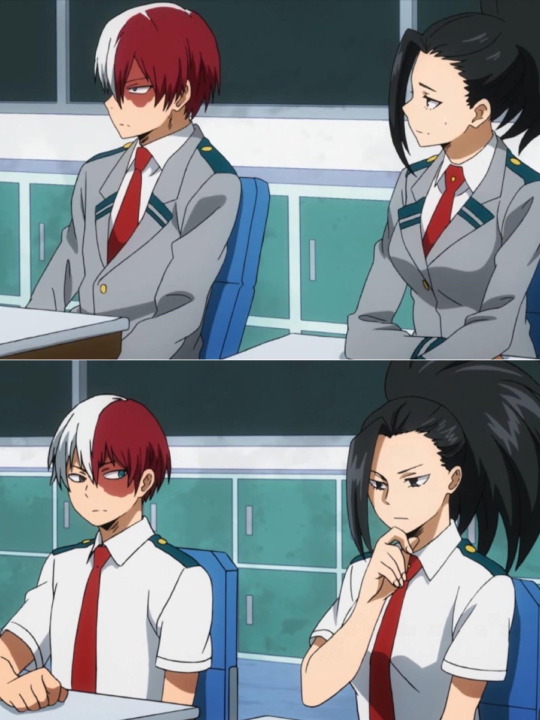
First of all, as you mentioned anon, they dont have 'the balance'. Usually, if two characters are 'parallels', their similar sides may lead them to understand and relate each others while their opposite sides may lead them to attract, challenge and even balance each others. That kind of pair always works. Because thats actually how most healthy partnerships works, whether its romantic or platonic.
For example, Shouto and Izuku are both abuse victims which is why they can relate and they would rather trust each others than trusting an adult or any autoharity figures while Izuku's expressive and anxious nature match with Shouto's calm natures. Or Shigaraki and Toga. Toga's positive nature balance Shigaraki's hatred while their bratty monstrous side make them relate to each others.
Ironically Shouto and Momo is opposite of this.

Their similar side is that they are both airheaded, rich, beautiful kids with amazing quirks. They are both sheltered kids, this is why their similar side would limit their worldview. Because neither of them does know nothing about being an outcasts or common people. They live in their own world. I think both of them need to see outside of world of their own. But neither of them seems to realize they even need to develop that side of them. This is why this doesnt work. Even their opposite sides, such as Shouto's being abused child while Momo never experienced that. She is naive. There is no abuse in her world. No pain. She wouldnt understand the signs or other things. For example, Ochaco is similar to Momo about this. She isnt abused but because of her family's sitution and all, she notices when people are in pain but Momo isnt. Not blaming her though since thats how she was raised. But this is why their relationship doesnt work. Momo and Shouto cant balance or challenge or really relate each others as characters is why i dont ship them.

Though, i wouldnt be surprised, if it becomes canon because Momo is the only 'female student' he seems to really interact with and Momo repeatedly said she trusts 'Todoroki-san' or how she appears randomly each others arc, such as how happy Momo looked for Shouto on license exam from background or how Shouıto randomly starts talking for Momo at class a vs class b arc. These are actually my problem with this ship. Because it isnt earned.
As you said anon, Aizawa is the one who noticed Momo was having problem and thats why Shouto helped her. Not because he noticed that she was having trouble. And he gave her courage by saying he voted for her.
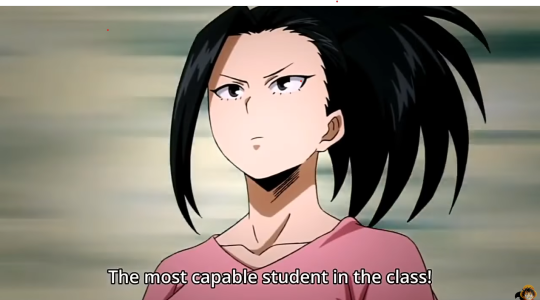
Look, i do understand why Momo would admire Shouto. He is the best, strongest student in her class. Who wouldnt be happy, if class best student said they trust you to win the match and i do understand why Shouto would trust her abilities since she is smart and very good at making plans. But thats it.
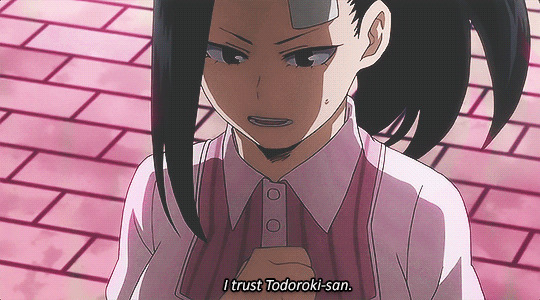
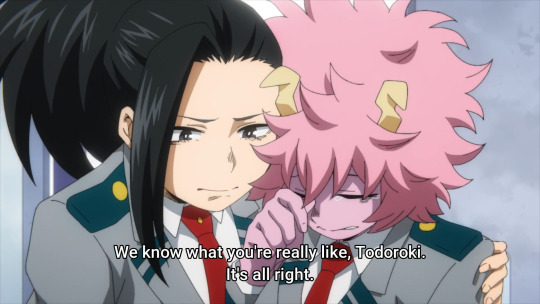
Why would Momo trust Shouto to the point she would go against the rules to save Bakugou? I mean, we know Shouto is kind, trustworthy as audience but Momo doesnt know that?? He never showed that side of him to her. She knows nothing about him. She puts him on high regard since the beginning even when he was Earlyroki, just because boy looks perfect but Shouto needs someone who wouldnt view him as perfect. I would rather to see this as just some admiration or small attraction than actual love. It makes more sense that way.
Compare this to Iida, Izuku, Ochaco, Shouto group. Group trust Izuku because he broke his own body to help people, to help Ochaco, to help Shouto, to help Iida but what did Shouto do for her to trust him that much? Nothing.

Also the scene when Shouto speaks for her of all people is kinda laughable to me. Like, Shouto, you know nothing about Momo. You guys dont even talk at all. You wouldnt know how she would feel or think. It would makes more sense if it was Jirou who said that since 1- they interacts a lot 2- at usj attack, she saved her and Kaminari. Wouldnt it makes more sense Jirou to speak for her, like how much smart she is or show she feels lack of confidence sometimes and all.
I keep saying it feels forced and superficial because they trust each other's abilities and thats why they trust each others but as person, they are strangers.
Well, lack of interaction between kids in class1a is one of the issues with writing. Especially between female-male relationships. This is why 'gay' ships seems more makes sense lol since author doesnt really bother to develop others (especially female characters). But i think some of those relationships still feels deep and makes sense, while those two doesnt. And it isnt well build at all. Though, just as i menitoned at first, because of their dynamic, i still wouldnt like it. Its like shoujo manga romance, kinda innocent cool handsome rich boy x pretty rich girl dynamic, to me, its undermines both of their characters because they are more than this.
During the story;

Momo is hardly part of main plot. She is beautiful. She is talented. She has parents and friends who uncontionally loves her. She is smart. She is good girl. She seems to interacts with Jirou and others. Her rivalry with Kendou is interesting. She hardly even talk with Shouto.
Shouto is one of the main characters. Story focus on his relationships with family the most. His main hero partners are Izuku and Bakugou. His best friends and only people he seems to prefer to hang out is Izuku and Iida. And he is literally experiencing one of the most important events in his life during the story. And yknow what? Momo is not part of it. She is just there with others.
- - -
Though, it is always fun to explore different ideas or ships and thats why i was kinda interested in some analysis. But yknow, when you read some posts, you feel 'its reachin'. Thats how i feel about Todo//momo, Kacch//acho and Bakugou/Aizawa posts.
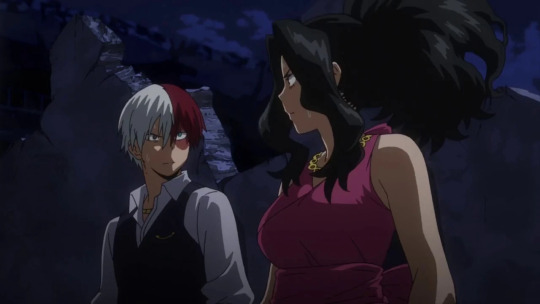
Like when two characters existing in same scene or wearing similar clothes or just standing side by side, some fans immediately look for making it look deeper than it actually is. (Though, you might say this is the case for every ship but some of them at least makes sense.) This is how i feel when i read comments about todomomo. It feels a lot like kinda crack ship in canon while it treated as it is better than that.
Another biggest example of this is Uraraka vs Bakugou. People like the idea of Bakugou trusting Uraraka so much that they ignore the fact that she is the only person he asked 'are you sure?' before the match, or how he thought it was Izuku's plan or we all know the only reason Bakugou is serious when it comes to matches ebcause he couldnt care less if others person gets hurts. People really think that romance would fix the problem with Bakugou. Especially, of all characters, its Ochaco. It doesnt make sense emotionally intelligence girl like Ochaco who was raised with love to fall in love with abusive guy like Bakugou who calls people with nicknames and constantly being rude to them for no reason, instead of kind boys like Izuku, Iida or Shoutoo respects who her as person since the beginning. Only girls who would date with toxic guys are whether they are naive or most likely they are abused at home. Ochaco isnt either of them. And Bakugou already has someone whom he naturally bond, it is Kirishima. Which is why even though i dont personally ship, i think kiribaku makes sense.
And with Bakugou, i dont know. I feel like fandom is kinda protective of his character. You cant make posts about it without being 'anti'. Like, certain part of the fandom treats them as just people who wants Bakugou to suffer, despite the fact that %90 of the 'anti bakugou' fans has problem with writing. Most posts less about 'hatred for character', more about 'writing criticism'. I mean fandom is very comfortable with cricitising Izuku for every single mistake he does, they cant do that with Bakugou too? Izuku becomes copycat for copying Allmight but when Bakugou does, it is cute. Izuku gets hate for telling Shouto, he is kind for forgiving, even though he clearly didnt mean to say not forgiving is unkind while Bakugou shouts at Fuyumi for no reason and he gets away with narrative and fandom. It is really weird how much narrative (and fandom) overlook Bakugou's abuse towards Izuku and the fact that Bakugou has big plot armor.
Recently, i realized there is similar problem with Aizawa and Endeavour too.
Or Someone's comment about how Bakudeku is simiar to spinnaraki. Yeah, i kidna see the parallels but except yknow, Bakugou abused Deku while Shigaraki never once judged or looked down on Spinner and they actually bond because they both feel empty, not forced connection such as 'you two need to learn from each others'. I would say it looks more like Dabi-Spinner dynamic since Dabi is kinda jerk to Spinner but boy still admires Dabi for his power and all, though at least Dabi isnt really bully to him specifically and Bakudeku dynamic is a lot simişlar to Koutaro-Shigaraki dynamic, Bakugou is literally parallels with Endeavour but its not mentioned enough. So yeah, Bakudeku is another forced relationship and worse, it is toxic.
- - -
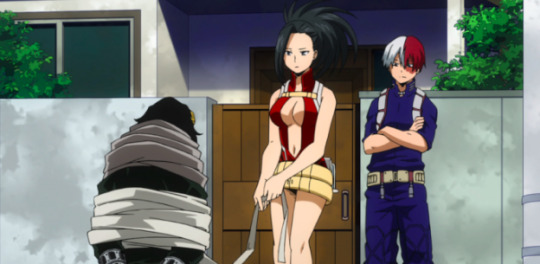
Basically, Todomomo ship feels forced, unearned and, mostly empty. Supercifical. This story isnt even really about romance whether Shouto or Momo's character isnt about romance at all but in stories, romances can happen but yknow, if its gonna happen, it should be well written. In their cases, well, its not. I would prefer them as good hero partners than as romantic couples.
#anon ask#platonic todomomo#bnha analysis#bnha ship meta#bnha ship analysis#mha meta#anti kacchaco#anti kacchako#anti bakudeku#yaoyorozu momo#todoroki shouto#bnha criticism#writing criticism
97 notes
·
View notes
Text
The Case of Lonely Mothers p. 1
A study about the "similarities" between Mrs. Plinth and Mrs. Everdeen and their relationships with their respective children
Read only if you are interested in parallel Sejanus/Katniss. Otherwise just don't read it
For Juli (@julietasgf)
.
I should clarify before I begin that I do not believe that such "parallel" is something Suzanne put in the text. Most likely there was never any intention to establish a connection between Ma Plinth and Katniss' mother by this great author
This only a crazy idea of mine that arises from noting various overlaps between the two characters and is mostly based on assumptions and headcanon's about Ma Plinth - Mrs. Everdeen
I'm just doing this for fun
.
Now let's began
I know it may seem strange to make a comparison between Ma Plinth and Mrs. Everdeen
Mrs. Plinth is quite well loved in the fandom. Regardless of what people think of her son, most conclude that she is sweet and her fate tragic, as she was a very devoted mother. Mrs. Everdeen on the other hand is one of the most controversial and hated characters in the franchise, and although opinions about her are divided, most conclude that she was a bad -or even the worst mother
The proposition here is that they are a reverse mirror of each other
I. Without a Name
We know that the narrators' perspectives are the cause. Coriolanus has no interest in knowing Ma Plinth's name (and really none in knowing her or talking to her beyond what is necessary)
Katniss on the other hand has a complicated and conflicted relationship with her own mother, which is reflected in this conscious or unconscious choice to deprive Mrs. Everdeen of her name in order to lock her into the role she theoretically fills in her life
If we could have a narrative of Sejanus we might discover his mother's name but I would like to point out that every time he talks about his mother he calls her Ma
Which is an affectionate nickname yes but in a similar way to Katniss it is a way of locking his mother into the role she occupies in his life
In this case mothers have no name. They are mothers
II. Different circumstances same story
The Plinth are rich. The Everdeens are poor
Ma Plinth and Mrs. Everdeen live in totally different realities due to their socioeconomic status but I believe that deep down, their experiences are very similar
I won't delve too much into the traumas within the games (Maysilee Donner - Katniss) that Mrs. Everdeen has but I will contemplate them when talking about the disadvantages she faced in her life
Let's move:
Mrs. Everdeen is described as a very talented healer. Belonging to the merchant class of her district, which is a high social stratum in her District. Katniss mother then comes from a background of privilege -compared to other people in 12
She falls in love with a man, a miner. He is from a very different class than her own and out of love decides to marry him and move to the Seam; the poorest area of Twelve and in doing so it is implied that her family turns their back on her
So you could say that Mrs. Everdeen had to abandons her home, her past life to be with the man she loves. Leaving her with his husband and her daughters as her only support system
And then she lose Mr. Everdeen. Left alone to care for two children in poverty
(This situation is even worst in her case if you consider that her best friend was killed in the games and had already suffered severe trauma from such an experience)
About Mrs. Plinth:
One of the first things we discovered about Ma Plinth is that she is a very talented cook. We don't know nothing about her background, she could have come from the merchant class or the poor mining class in Two. For our parallel it might be interesting to lean towards the last option but it is indifferent.
The important thing is that Ma just like Mrs. Everdeen falls in love with a man: Strabo Plinth.
Strabo ultimately may have been of a higher class than Ma but in the Plinth's case that is not the scandal of their relationship. The scandal is that during the war Strabo, owner of a munitions and armaments factory, supports the Capitol.
And Ma, who loves him, decides to stand by his side. I should note before continuing that the war itself is a traumatic experience to live, it is true that the trauma may be less severe if you have money and privilege but it persists. Ma carries this trauma on her shoulders
Strabo makes the decision to move his family to the Capitol. The most influential and wealthy area in all of Panem. And although she has her doubts Ma follows him. Her family turns their backs on her (only one of her sisters keeps in contact with her, while the rest of her family has decided to make zero contact with Ma)
So we can see that Ma as Mrs. Everdeen had to leave her home and her past life to be with the man she loves. Leaving her alone with her husband and her son as her only support system
In the Capitol, Ma ends up as isolated and depressed as Katniss' mother at the loss of her husband. Both have lost their primary community and are on their own. They are now two lonely mothers
This is not to say that losing your partner and moving to the Capitol are equal and comparable experiences at all. Because they are not. The only connection that I establish between these events is that they were traumatic experiences, the turning points that will mark the life and the relationship that these characters will have with their children
I also considered it important to consider how different circumstances influence the experiences of these characters. Ma Plinth lived through the first rebellion, lived through the war and the first decades of the post war, but that does not take away from the fact that she comes from D2, one of the richest districts in Panem, which while oppressed by the government, its disadvantages cannot be compared to those existing in D12 as they face more severe oppression
Especially in a D12 under the direction of President Snow, in a Panem where games are a constant -and Mrs. Everdeen its a victim of them in many ways- but equally Mrs. Everdeen's "social descent" to the Seam probably involved its own challenges, and adaptations but these were very different from the "social ascent" that involved the Plinth's move to the Capitol and the violent xenophobia they had to deal with on a daily basis without any external community were to lean on + the severe rejection that it is implied people from Two had against them
III. Children surviving on their own
Before we delve into how Mrs. Plinth and Mrs. Everdeen's response to a severe trauma - turning point eventd in their lives, mirror each other and define their relationship with their children (a mother who is completely devoted to her son, a mother who is completely neglectful of her daughter) we must talk briefly about Sejanus and Katniss and their relationships with their fathers
We could say a lot about these relationships (Especially in the case of Sejanus and Strabo) but this is a post focused on Mothers so we will limit ourselves to three aspects:
1. Who they look like, 2. Quality time, 3. Survival lessons
Katniss is a living portrait of her father. It is the first thing to inadvertently establish a noticeable distance between her and her mother (who is blonde and light skin and had color eyes). Our girl on fire possesses the typical traits of the Seam and the prejudice they carry, by her physical appearance Katniss is already confronted with a set of experiences that her mother will never experience and which intimately binds her to her father
There is an implicit recognition of being equals just because of how they look and they must navigate the world because of it. What becomes a more special and tragic bond when her father dies and Katniss has her own reflection to remember him by, she is in a way the only thing left of his appearance and it is this in turn that could also drive the wedge between her and her mother
For Mrs. Everdeen, her daughter had the face of a ghost
In the case of Sejanus and the Plinth in general the physical descriptions are vague and nonexistent. Again, Coriolanus' narration has its priorities according to his character -he inform us how badly the Plinth dress but not what they look like
We could go with the movie on this, and although they appear in only one scene, it is obvious that Sejanus is his parents' son, but his round face, hair and large brown eyes seem to immediately distance him from Strabo. He looks more like his mother and we can say that possibly Sejanus also moves through the world in the same way his mother does not only by his physical but by his manners. He moves in the manners of the District
Is relevant because even if we could not confirm it, there are gestures in the text that hint that Strabo has preferred assimilation to move around the Capitol. He adopts its ways, while his wife keeps an altar to her old house in D2 -where she has not been for more than a decade-, Ma its the one that spend most time with Sejanus and that would influence him. For example their time together probably make that Sejanus knows the traditions around Death in Two
Which ultimately leads to quality time. Before Mr. Everdeen dies, Katniss's family seems stable and loving, her problems with her mother are far from starting but it still seems that it is with her father and not her mother that she spends the most quality time with
As I said previously there is a good starting point for this to happen in the physical aspect. People will never treat Mr. Everdeen the way they will treat his wife, which translates into people will never treat Katniss the way they will treat Prim, Mr. Everdeen knows that and act accordingly by spending more time with Katniss to guide and teach her things she might not otherwise know -which will end up leading to survival lessons
It must be said that it also influences what appears to be a personality resemblance between Katniss and her father, which causes a greater understanding between them, and the reason of why Sejanus and Strabo couldn't work
I wouldn't say that Strabo was an absentee father but I think we can assume that his work is very time consuming and since he is the sole provider for his household, the chances of him spending much quality time with Sejanus are slim. Which drives a wedge between the two, a wedge that will only grow wider as Strabo tries to get closer to his son through survival lessons
Many will agree that Sejanus was not given the guidance or tools by his parents to be able to survive in the Capitol but we can't say they didn't try. Strabo did. It was just that his survival measures failed to communicate with Sejanus belifs -and we might wonder if they were the right measures in the first place
Strabo did a lot to ensure Sejanus' survival, and to teach him how to cope with the world. He left him an inheritance that would ensure his economic well-being and tries to teach him how to keep the business, took him to the Capitol where to "free" Sejanus from the hunger games and takes care to let him know how unique his position is, taught him how to shoot but Sejanus hates it. Every time that Strabo try to teach Sejanus a survival lesson he fails to communicate them and consequently his son never use his lessons 99% of the time
Why does he fail? There are many things that go into it. From literally the language he uses, the different ways Strabo and Sejanus handle the trauma of living in the Capitol while being from the district, but I think the primary thing in causing this fatal miscommunication is the similarities in their personalities and the fatal difference in beliefs
It's easy to see how Sejanus' character distances from Strabo's character; he's selfless, sensitive, gentle, and soft but also he's very similar to his father. His stubbornness, bravery, courage and pride come from Strabo. Fire with fire. This plus the fact that Sejanus is not being able to use the lessons of his survival from his Pa because they get in conflict with his thinking
It made that Sejanus had to figure out for himself how to survive in the Capitol
Katniss also gets her own survival lessons from her father (hunting, gathering, singing, etc) and Katniss unlike Sejanus uses them, although I should note that Katniss is partly forced by circumstance to use her father's lessons. It was literally a matter of life and death, she could not choose to alienate or distance herself from the lessons, and thus the symbolic burden of belief they carry, of her father.
Whatever, quality time, physical resemblance, a simple complementary match of their personalities, the way things were said and teach and gender along with other factors allow for more a effective communication to happen between Katniss Dad and her than the Plinths but still a fatal miscommunication takes place between them: death
While Katniss is able to survive thanks to the survival lessons her father gave her, their time together was very brief and the truth is that she was a child who only knew a handful of things about how not to die when she lost her dad. The rest she had to figure out on her own because the dead don't talk and can't guide the living
Understanding that, the question arises:
But what about their mothers? Couldn't they take care of them, or communicate with them once Sejanus and Katniss "lost" their fathers?
*Little note:
The gender also influences in this, because there is an expectation of masculinity that Sejanus is expected to fulfill and does not (being more typically feminine in his values) that Katniss in relation to her father not have (by the society in any case she is expected to be feminine and its curious that she kinda adopts instead typically masculinity values). And I haven't said it but I think it is visible that just as Ma Plinth and Mrs. Everdeen are an inverse reflections of each other, something very similar happens with Sejanus and Katniss AND I LOVE IT
Next part: The conclusion (I'll have to do another part because this is already too long HELP)
#sejanus plinth#katniss everdeen#ma plinth#strabo plinth#mrs everdeen#mr everdeen#the plinths#the everdeen#tbosas#thg series#thg#the ballad of songbirds and snakes#meta or something like that#paralells#ballad of toxic yaoi
12 notes
·
View notes
Text


Second girlie, is my silly little Roller Disco Queen, Patricia Molloy.
Here's some basic info! <3
Goes By: Patty
Nicknames: Patty, Clover
DOB: Jan.10th, 1958
Age: 20 (Until her B-Day)
Gender: Female, but isn't big on labels (She/Her)
Sexuality: Bi/Pan
Ethnicity: Irish
Occupation: Student (Health and Medicine Major), Two Possible side-jobs
Socioeconomic Status: Middle Class, never really had to worry about money, but isn't exactly the richest girl on the block
Place of Birth: Cork, Ireland
Family: Father's a respectable farmer, while her Mother's a stay at home type. Doesn't really get along with them though, she's happy to be a whole country away from them to say the least.
Height: 4'10“
Weight: 125 lbs.
Disabilities: None (?) besides being too short for things (Opposite problem as Manzo)
Fashion Style: Clowncore, but in a good way, Flashy Roller Disco Queen, with added minimum safety gear
Coordination (or lack thereof): Probably the most coordinated out of the Main 8, mostly because she's rarely not on wheels outside of class, girl's got balance for days
Personality Type/Trait: Entertainer - Spontaneous, Energetic, Enthusiastic, Never a Boring Moment with her, Cheerful
Introvert/Extrovert: More of a mix, but leans towards Extrovert most of the time. It really shines through when she's out on the rink
Intelligence: Average, gets good enough grades, and knows enough to get by, but she excels in Street-Smarts more then Book-Smarts
Self-Esteem: Slightly Above Average, She knows she's a Roller Disco Superstar and no one can even touch her skill, but she doesn't put herself above anyone in anything else (she can brag about one thing as a treat, otherwise she'd feel like an asshole)
Hobbies: Roller Skating, Dancing, Singing, Thinking Up/Drawing new outfit designs and looks, Drinking, She'd try anything to keep her mind busy
Skills/Talents: Autonomy, Ambition, Roller Skating, Creativity, Singing, Good at Standing-Up for Herself
Loves: A good drink, Roller Disco, Up-Beat Tunes, Trying New things
Phobias/Fears: Getting trapped in the same place forever, Conformity, Never Ending Boredom, Loosing her Reputation at the Rink, Lucya freaks her out a little (it's all due to vibes)
Angered By: People who underestimate her, Short jokes by other people (unless they're really funny or she's the one saying them)
Pet Peeves: Being the last person to know about something, Uncleanliness, Unreasonable people
Obsessed With: Roller Disco, doing anything to stave off boredom really
Bad habits: Talking over people (usually she just doesn't realize it), her priorities are kinda scewed (usually Roller skating takes up her highest priority), not the most concerned with safety, a bit of an Adrenaline Junkie
Desires: True Freedom, Finding out who she is through exploring and trying different things, something or someone stable that she can rely one that isn't just Roller Disco
Flaws: If she had to choose between Roller Disco or Saving someone's life, she'd choose Roller Disco. Wanders around aimlessly a lot, kinda of an outsider (still accepted by the group, but she doesn't feel like she quite fits in)
Secrets: Second most likely to kill someone and get away with it. Feels like she has the weight of the world on her shoulders, and can't share that burden with anyone. Her disdain for her life back home. Not the biggest Disco Music fan.
Regrets: That she couldn't ”fix“ her family, and instead kinda just, up and left them. Not giving it her all in school, despite her decent grades, she feels like she could, no should, do better.
Accomplishments: She has her picture framed at the Roller Rink, and a few trophies from some of the past Roller Disco competitions, has had some request to design some outfits and got paid for it (other Roller Disco Fanatics probably)
Languages Known: Fluent in Gaelic and English, and has picked up on Swedish (from being BeeDee's Roommate) and some Afrikaans slang (from hanging out with Shelby)
(Things are subject to change the more I get things fine tuned, I've also kept some things secret for the time being. - Crow <3)
Bonus! Basic Profile Sheet, for funsies! X

6 notes
·
View notes
Text
Okay …. I kind of wonder with the prevalence of ADHD diagnoses in the past few years, if that statistic of 5% of people who have ADHD graduating college is a little low?
Doesn’t change the fact that universities very much do have issues with accommodating people with ADHD or really any disability.
However … after googling the hell out of it - I have yet to find the actual published study that says “5% of people diagnosed with ADHD graduate from college”
The ONLY source I have found is this news article https://wcfcourier.com/news/local/for-adhd-students-transition-to-college-is-tough/article_950df28a-ac05-5b50-8768-2ed34aa05376.html sorry it’s behind a paywall
And that doesn’t cite the study only says “according to a 2008 study in the Journal of Learning”
So one single study.
In 2008.
There have been some other studies that have found lower graduation rates of college students diagnosed with ADHD but not as extreme as 5% (okay those you’re going to have to look up yourself - I’m like tired).
The thing is, there are a lot more people being diagnosed with ADHD now - I got my diagnosis last year. I’m 30. I have a college degree and a job (this isn’t bragging - many other people I know who have ADHD are also working in my field and that requires at least a Bachelor’s if not a Master’s)
5% is a fucking grim number and I don’t think it’s actually representative of the true graduation rate. I can’t even find the stupid study that says that - only the news article - so I can’t really read what their methodology was. What was their sample size? How did they choose participants? How did they gauge educational outcomes? Were there maybe confounding variables? (Like race, socioeconomic status, etc). Didn’t see if they were looking at Associates vs Bachelors or anything.
In conclusion:
I think the 5% figure is most likely bullshit or at least comes from a single study that I cannot find that was done in 2008. That’s 16 years ago.
I think that there are still serious differences in educational outcomes between people diagnosed with ADHD vs neurotypicals. Colleges are indeed very shitty about accommodations and professors very much can just not give a fuck. (Source: I was in college … it took me almost a decade to get through undergrad)
Anecdotally (so very much not scientific) … in my current field of work where you need at least a Bachelor’s degree (if not a Master’s given how fucking competitive it is) - I have met a ton of people with ADHD. None of them came from like rich families that were willing to chuck money at the school to keep their baby in college. I’ve met people with ADHD in other scientific/highly technical fields that require at least a Bachelor’s for any job. There are more people than you think.
Some people may not follow the typical college track where you graduate high school and go to college right afterward like it’s 13th grade or something. In fact some people go do other shit for a while before saying “y’know I want to get a degree”
A lot of adults now are being diagnosed with ADHD as we gain a better understanding/diagnosis criteria for it. People are now self-diagnosing and also seeking a diagnosis now that, due to increased awareness of what ADHD actually fucking is, are like “ah fuck so I wasn’t a lazy idiot in my childhood like my parents and teachers told me I was?!”
If you are just starting out in life and have an ADHD diagnosis … please do not let the 5% statistic dissuade you from pursuing a college degree. It’s not hopeless. If you want to go to college then go to college.
Scientific studies can have glaring weaknesses. Which is why replication of results and peer review are super important. One study that says the graduation rate of college students with ADHD is only 5% does not make it true in the wider context. You need multiple studies.
4 notes
·
View notes
Text
Blog Post Week 4: Due 9/19
How have names contributed to racial bias in both technology and society, and what are the consequences?
I truly believe that names, including nicknames, are strongly tied to people’s identities. For example, I get upset when my boyfriend calls me by my full name because it feels rude I prefer being called Val. So, yes, names matter they’re more than just labels. They reflect culture, status, etc. Think about how Kylie Jenner was criticized for naming her baby Stormi, but now many moms love that name. An uncommon name but Kylie’s social status changed that. So, how has technology contributed to making names a source of racism? It does. Studies have shown that they found that algorithms associated White- sounding names with “pleasant” words and Black-sounding names with “unpleasant” ones (Benjamin, 2019). This shapes how society perceives names. For instance, law enforcement is developing as their use of technology increases. This can cause where an unfamiliar name might lead to someone being unfairly judged as a “criminal.” The fact that technology uses names as a data point is a red flag. It’s not technology itself that’s racist-it’s the people who designed it, embedding their own social biases into these systems.
Why is technology being compared to Jim Crow law?
Jim Crow laws were designed to continue the separation of black and white people in everyday life, without explicitly saying it but enforcing segregation through legal means. These laws affected everything from where people could eat to where they could vote. Similarly, technology today has created a digital divide between those who have access to technology and the internet and who don’t. But truly it just isn’t a gap between socioeconomic but rather identities. The problem is, some argue that addressing this issue might violate freedom of speech. But why are we accepting racism online as something that’s okay? Just like Jim Crow laws, technology has created barriers that deepen inequality.
How does intersectionality shape individuals experiences in a digital space?
As Crenshaw explained, intersectionality is a way to understand inequality by looking at how different parts of a person's identity comes together. It's a prism for understanding many more social problems. Encourages people to think about advantages and disadvantages (Crenshaw, 2018). This idea helps us understand how various aspects of identity, like race and gender, combine to affect experiences with discrimination. For example, algorithms and online platforms can create unique challenges for people depending on their race, gender, and socioeconomic status. When creating fairer digital policies and technologies, it’s important to consider these overlapping identities. Identity is about the relationships between people in different communities and understanding each person’s unique background, both in the physical world and online.
Why is there a lack of awareness of these biases being present in major social platforms?
Noble discusses a case where Google was showing explicit content when searching for the term “Black women.” Google claimed this was due to a glitch in the system. However, Noble pointed out that it’s hard to believe such significant glitches could occur without the creators of these programs being aware of them. This issue isn’t highlighted because these are considered legitimate and trusted programs, yet they still fail to address these problems. As society, unawareness comes from normalizing bias. What we need to do is hold more accountability of the issue that is being put into our faces.
Benjamin, R. (2019). Race After Technology.
Noble, S. U. (2018). Algorithms of oppression. https://doi.org/10.2307/j.ctt1pwt9w5
National Association of Independent Schools (2018, June 22). Kimberlé Crenshaw: What is Intersectionality? [Video]. Youtube. https://www.youtube.com/watch?v=ViDtnfQ9FHc
5 notes
·
View notes
Note
You saying to avoid “'this white girl’s relationship with this white boy is forbidden because society hates love' forbidden love because it’s a bit played out" needlessly isolates a race of people. I know it's popular to make fun of white people as a perceived table-flip, but it's uncomfortable like it would be to point out any other race. You could say a standard 'nothing obviously wrong' relationship has no need to be dramatic, without putting a spotlight on a type of people for no reason.
Good morning (or whatever time zone you're in)!
I'm going to assume this is in good faith and you're not a troll, so I hope you take this with all due respect when I say, I think you have a fundamental misunderstanding of how race is talked about and presented in media.
I'm getting a whiff of "reverse racism" in this comment, and so first things first, bringing up the existence of whiteness isn't making fun of white people. (Also I think you're using the term table-flip wrong, but that's neither here nor there.) Acknowledging that white people are white*, and acknowledging that white people are treated differently in media than People of Color, isn't racist or making fun of white people or needlessly isolating a race of people.
Avoiding talking about race, and avoiding talking about the privileging of certain identities, is how we as a society get away with continuing to pretend that racism doesn't exist and the way that People of Color are treated in society is disconnected from the color of their skin or their cultural or ethnic background. We as a society talk about white people differently!
There's nothing inherently uncomfortable about talking about that--and if there is, well, maybe that's a discomfort you should sit with. Maybe you should consider why you're so uncomfortable with the idea of talking about race and about whiteness.
And now to the actual topic you were referencing.
I'm a writing advice blog. I give writing advice. And one of those pieces of advice is, when tropes become old and stale and irrelevant, let's stop writing about them.
Now, I will acknowledge that there are a lot of reasons why a white girl and a white guy might be forbidden from being in a relationship--a mismatch in socioeconomic status, a difference in religion, etc.
But what writers often do in stories where the idea is that it's forbidden because Society Hates LoveTM is they replace the very real struggles faced by same-sex or same-gender couples and interracial couples (as well as interfaith couples) and place them on a white girl and a white guy who are the same in class, religion, culture, and everything else that tends to actually cause this forbidden love.
It's generally cishet white people taking other people's real trauma and making it palatable to white people by removing the queerness and removing the mention of race. We get nice, neat stories where we get to pretend that sometimes love is just Forbidden because Society Is Mean, and it has nothing to do with things like homophobia or racism. It lets white people tell other people's stories without having to think about those other people too hard, because they're good with those white cishet people being together, but they might not actually be so okay with it if those people were both men or both women or if one of them wasn't white.
*the concept of whiteness is extremely complicated and situation-specific, but that's a topic for a different essay
58 notes
·
View notes